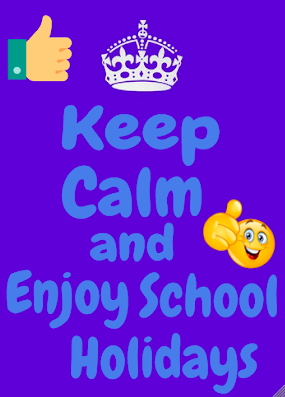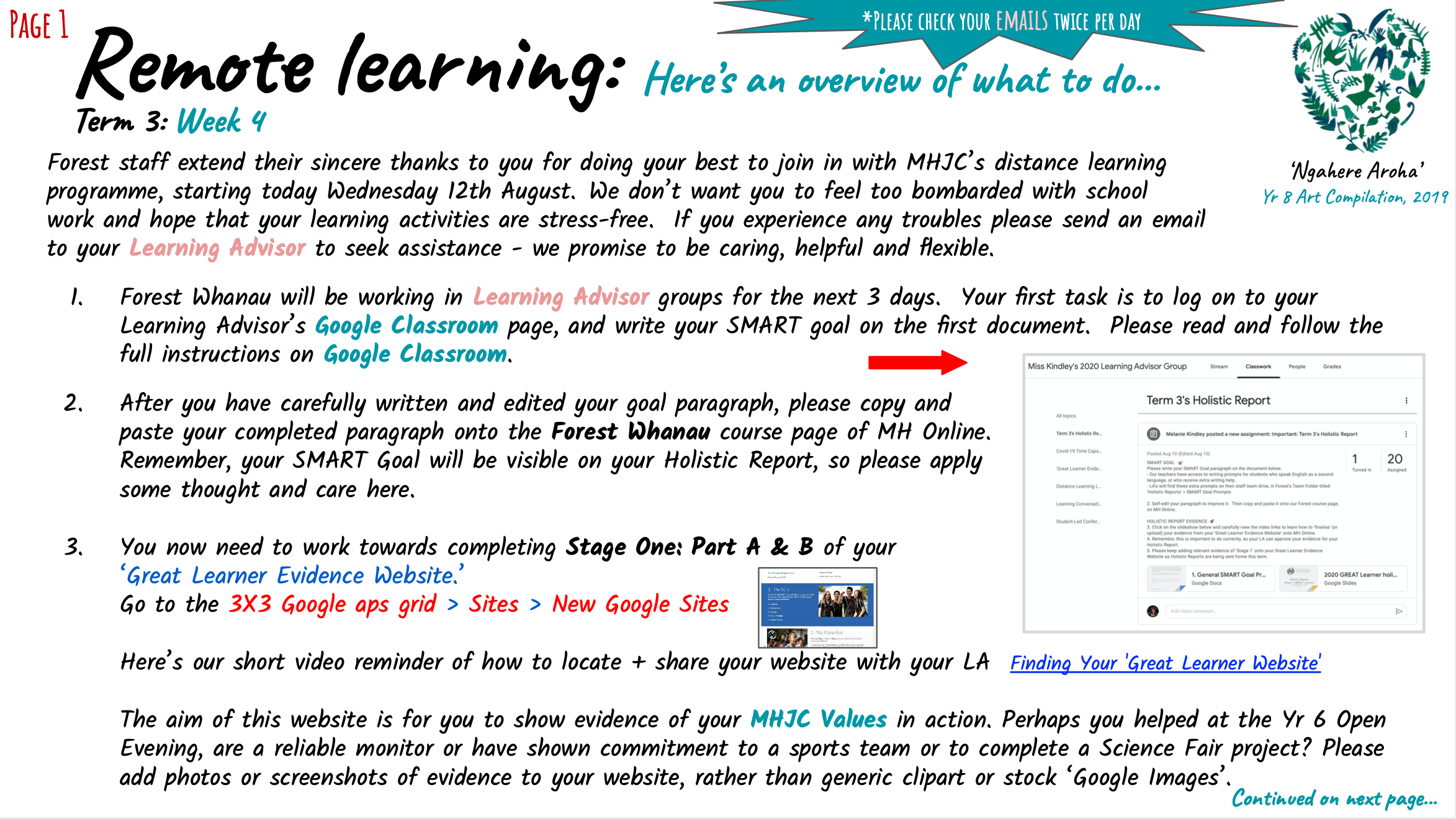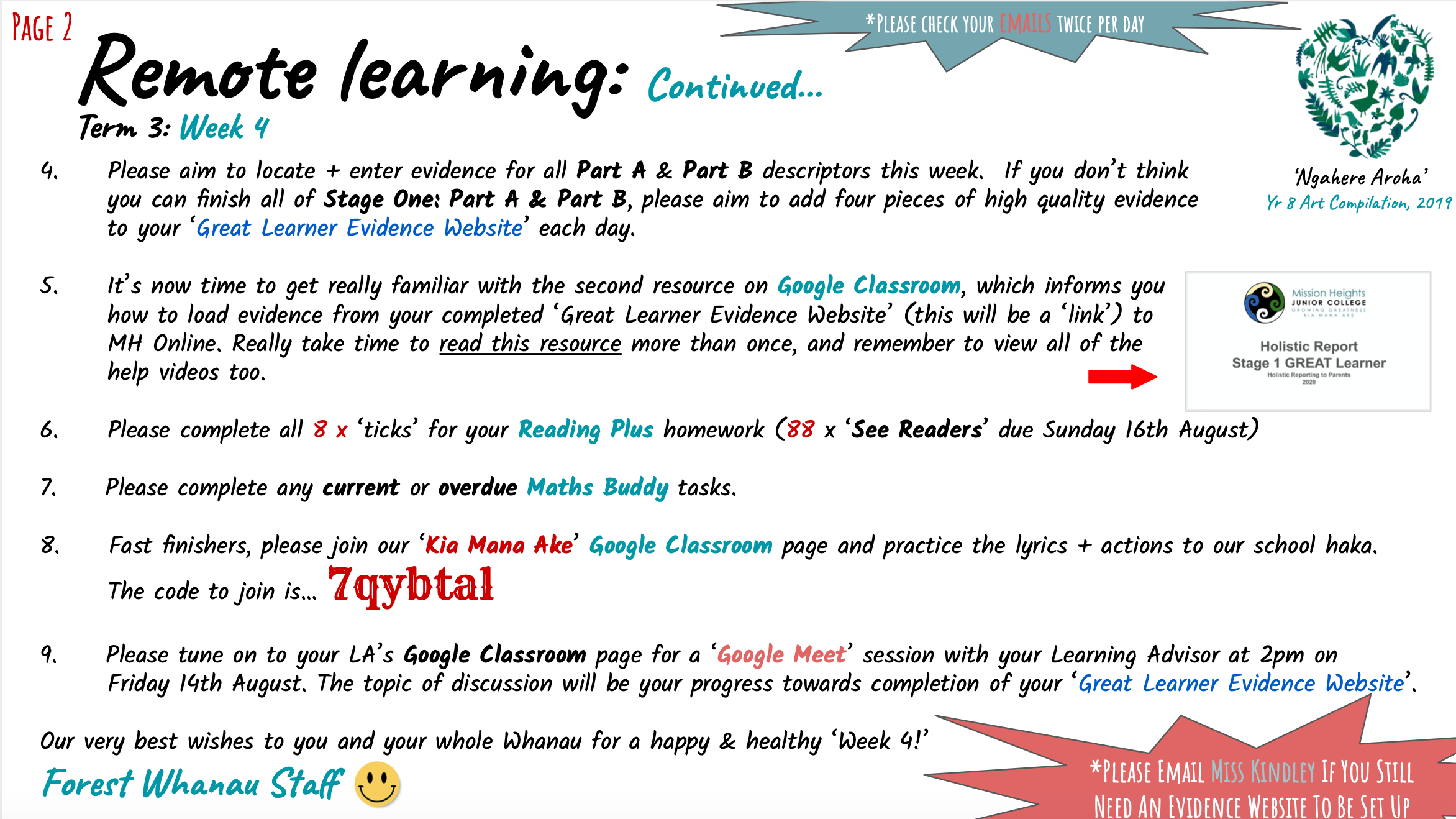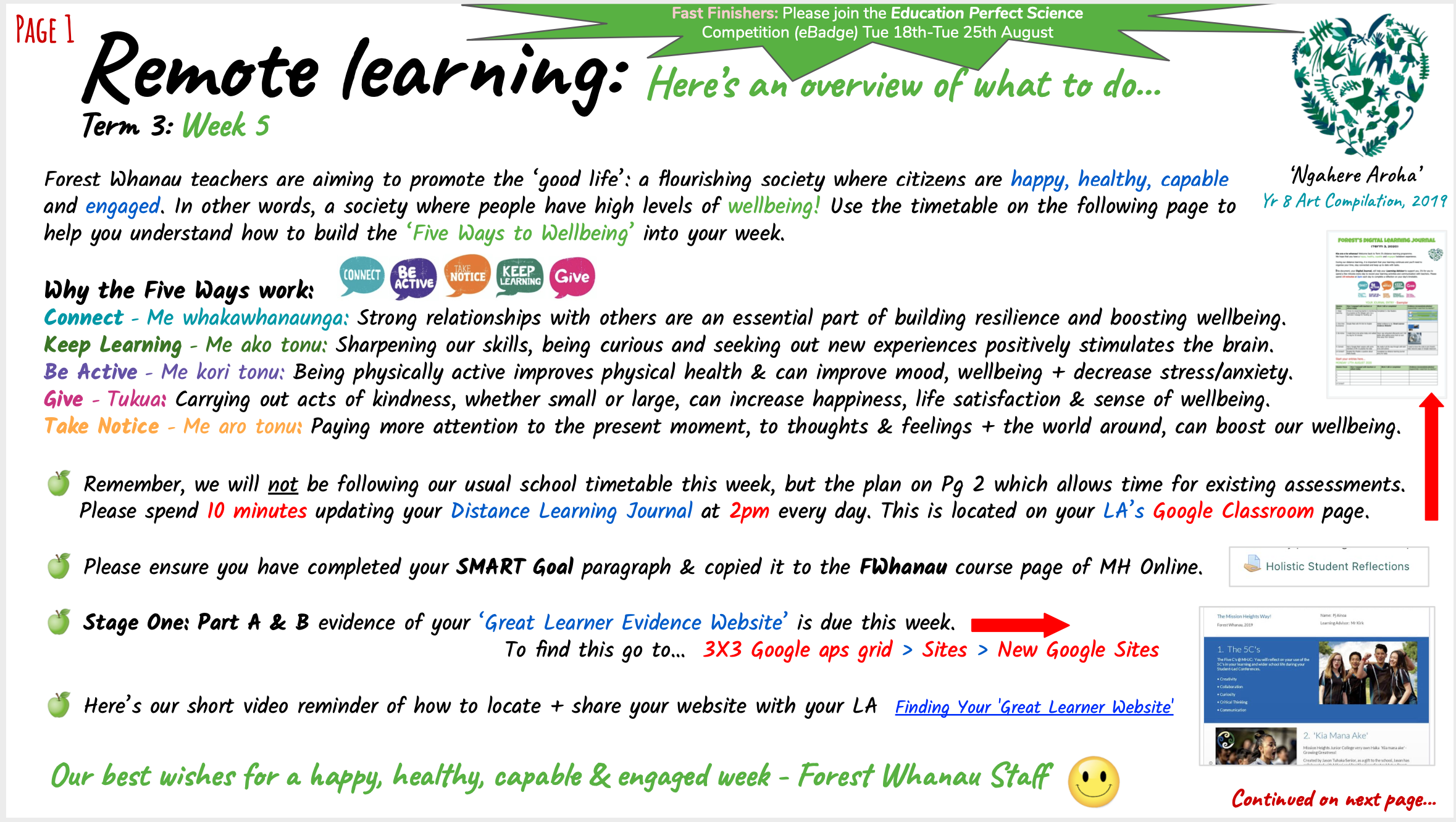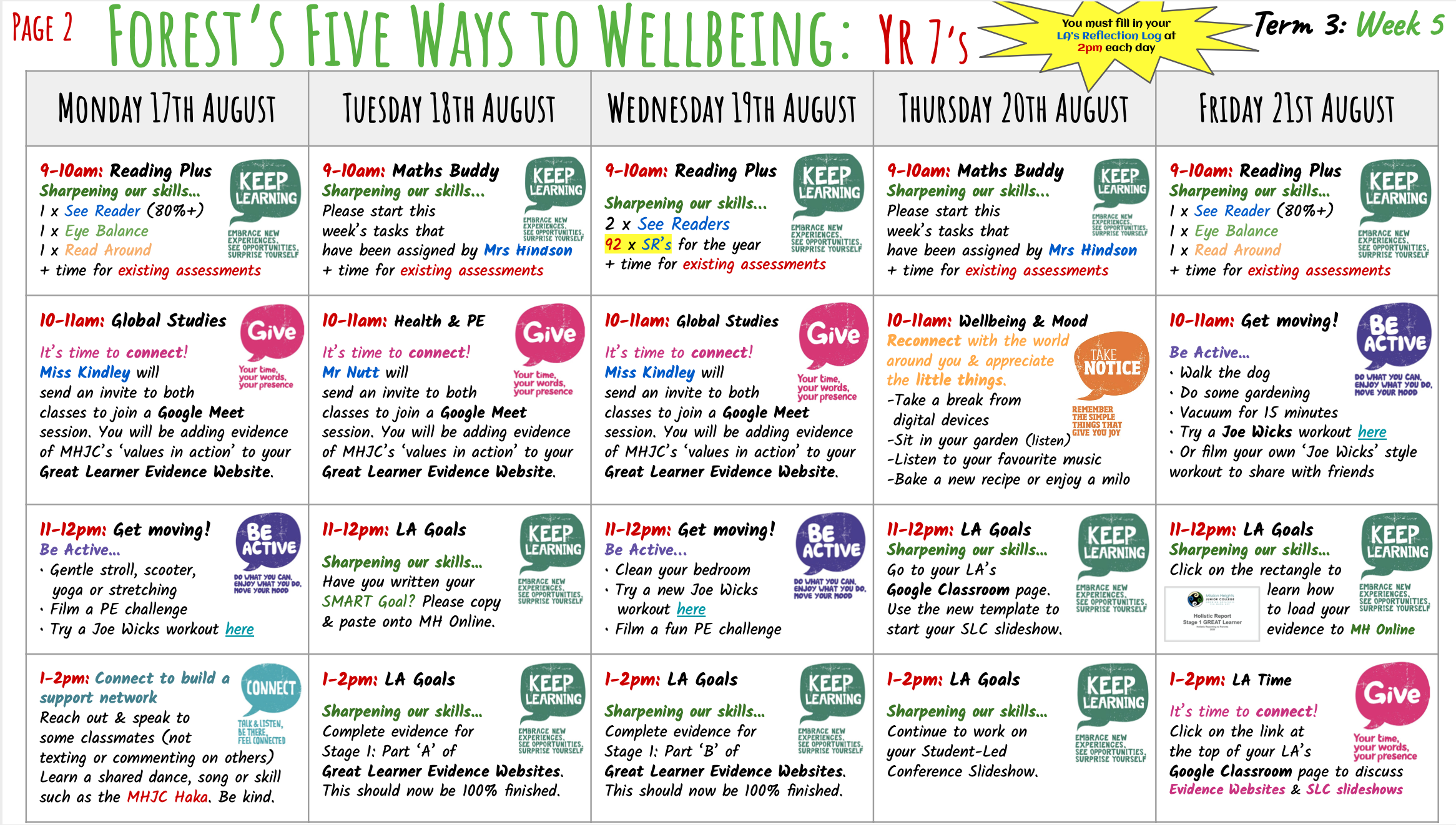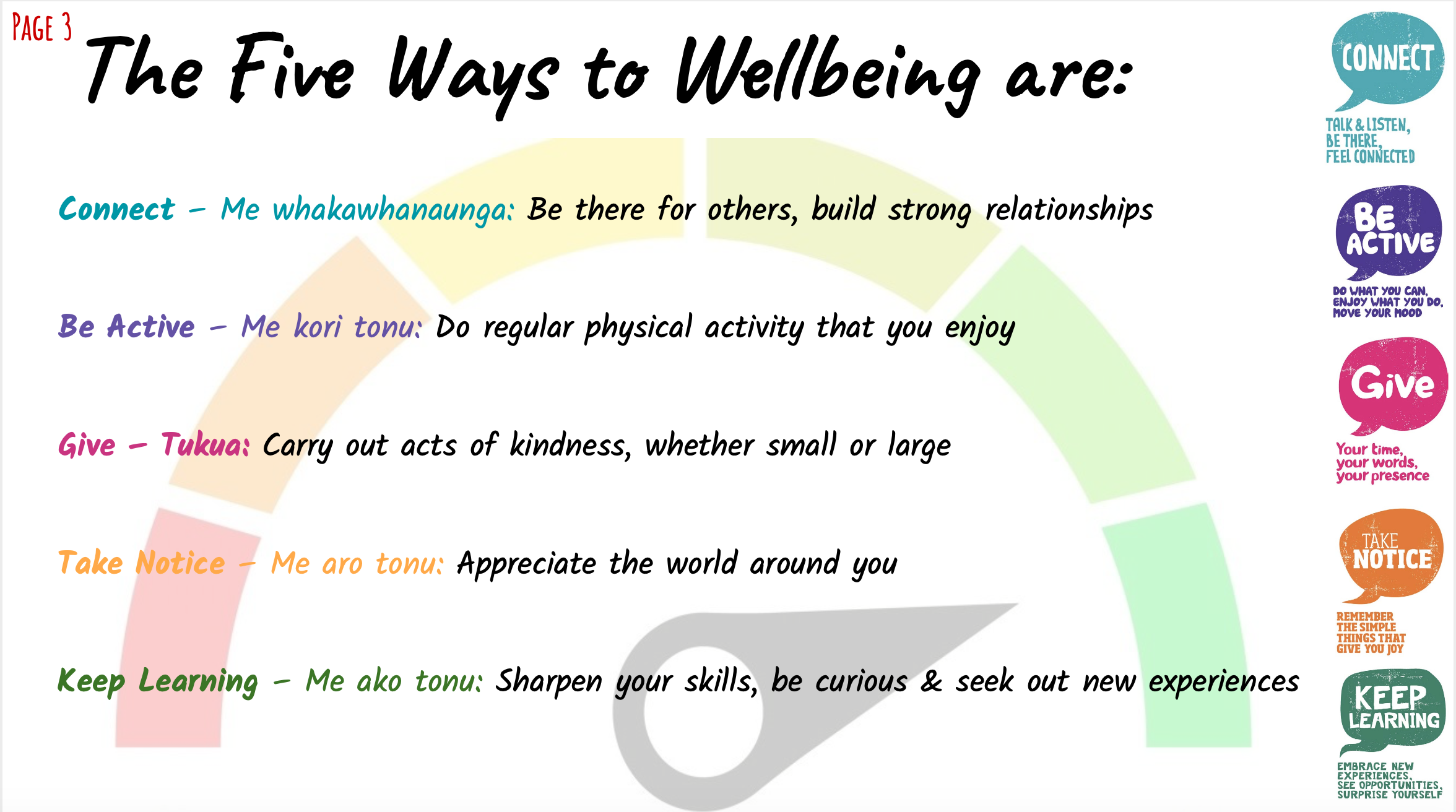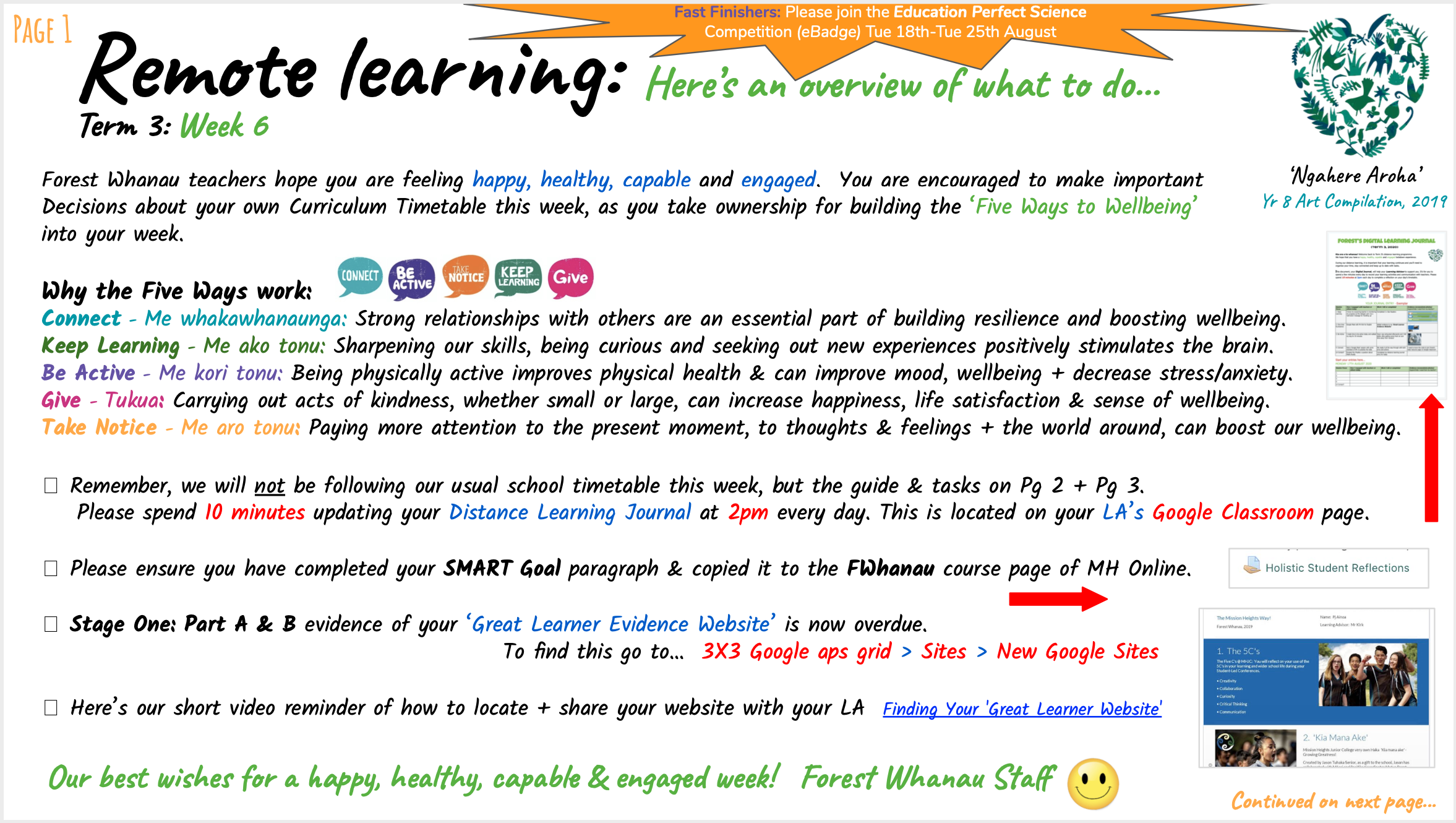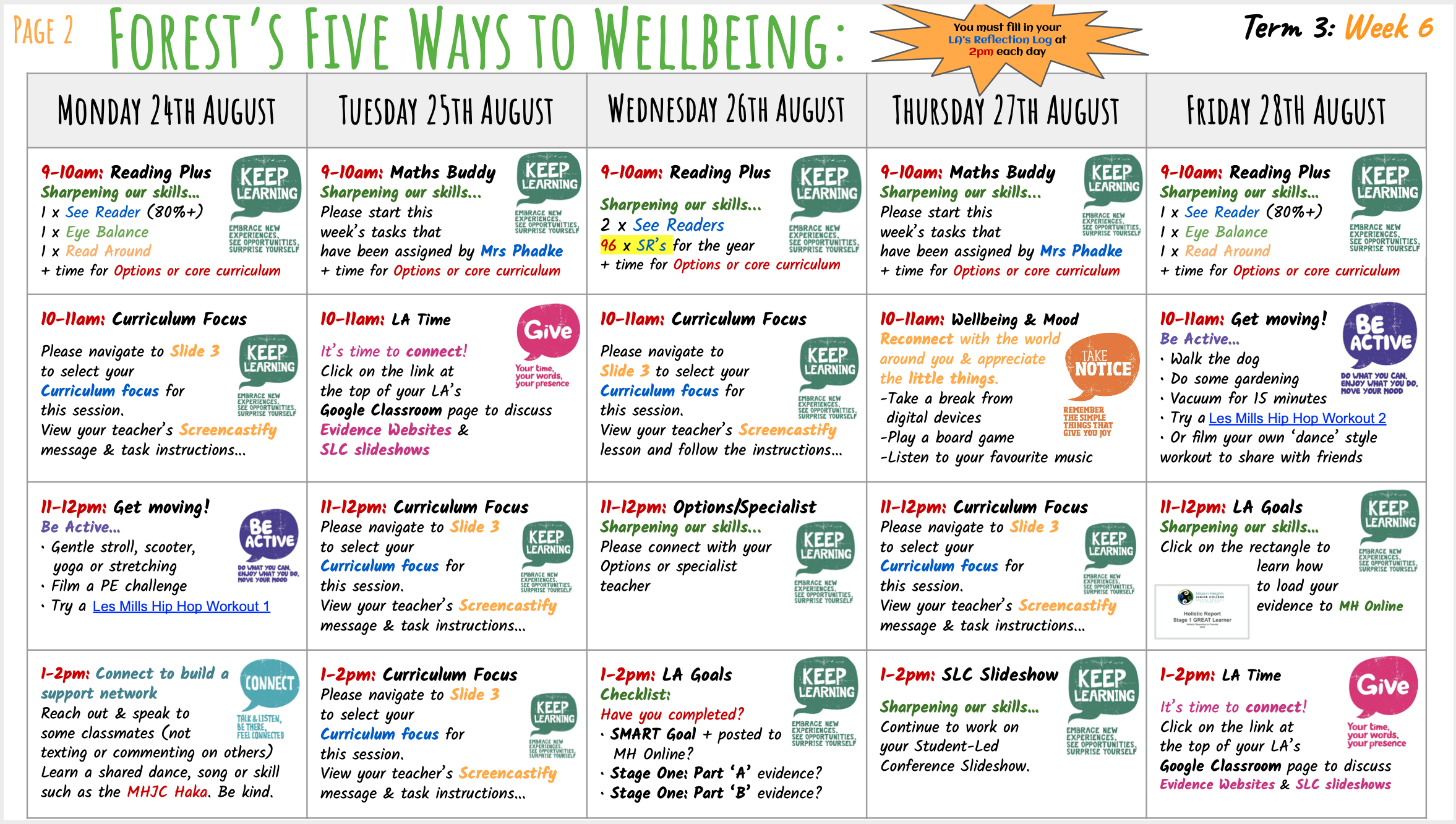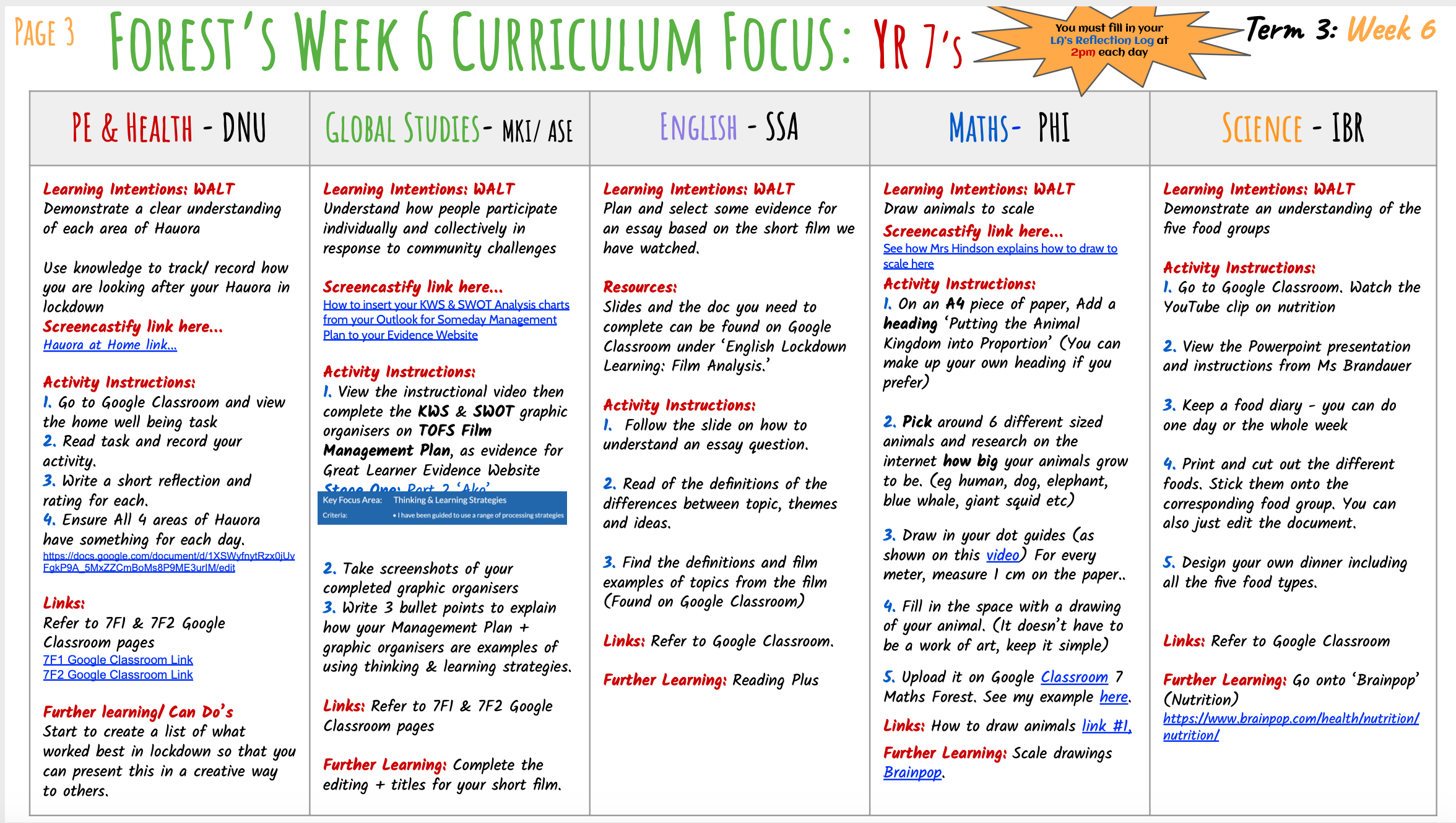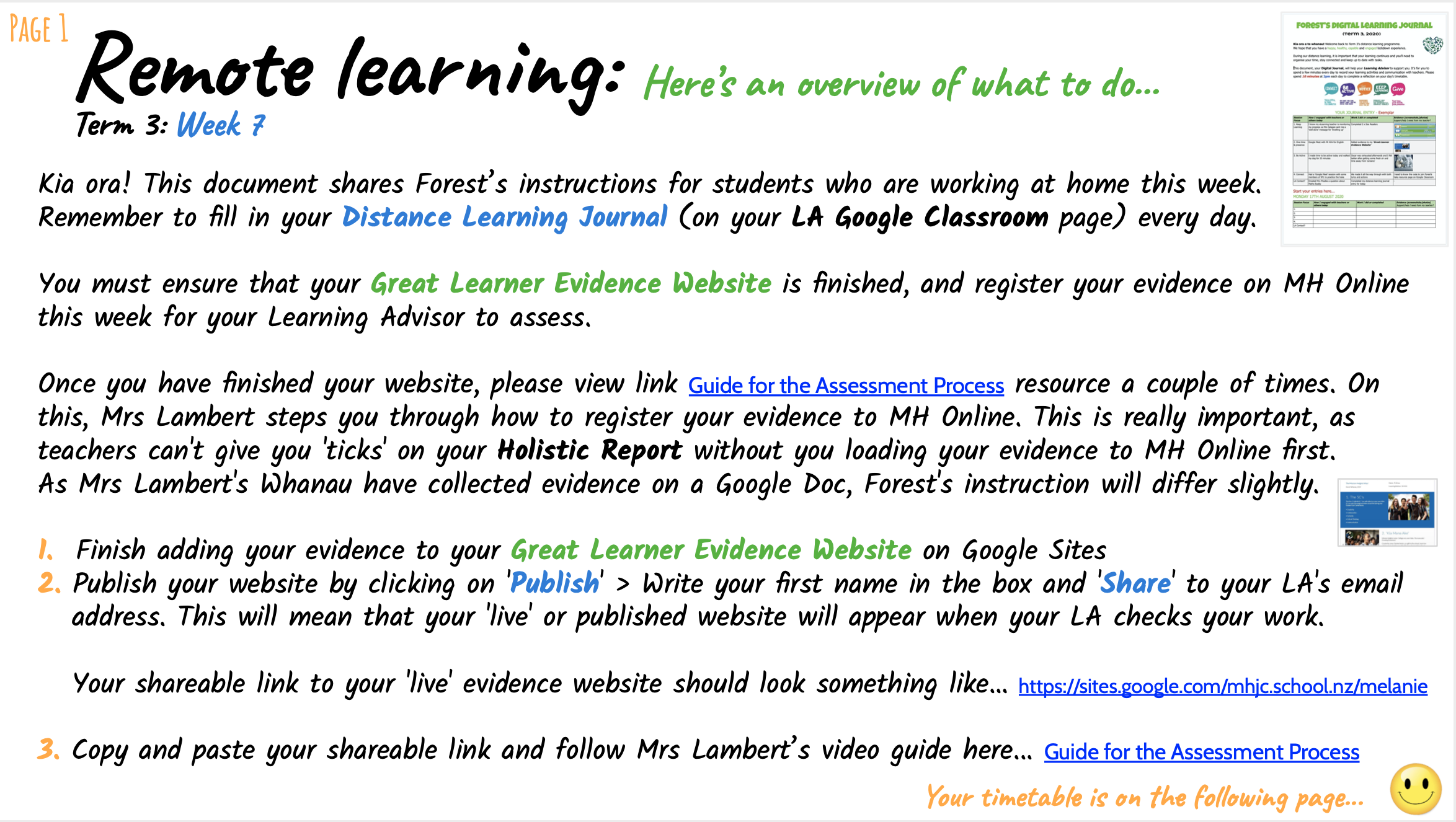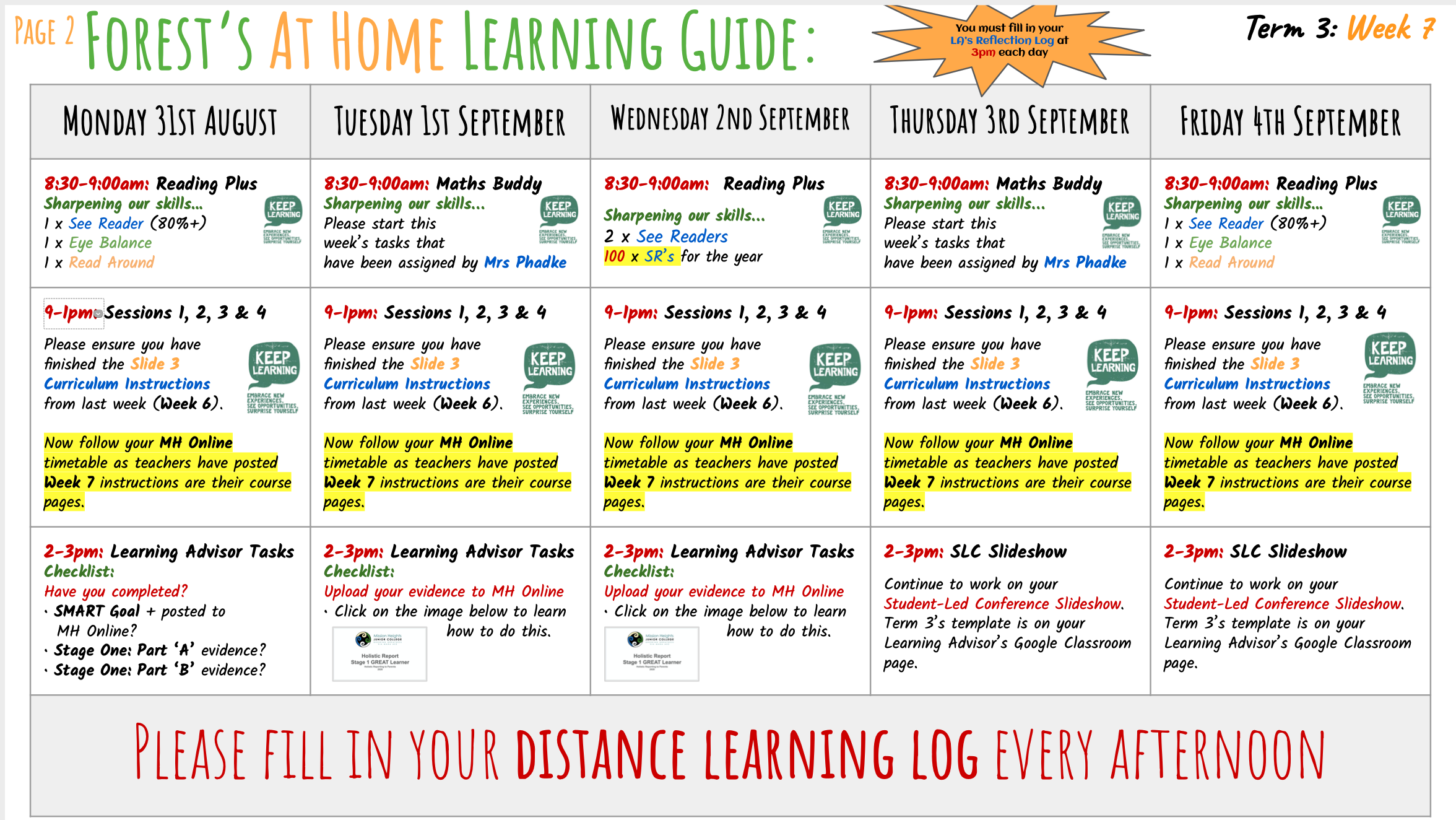7F1 Global Studies
Section outline
-
EXPLORE / TŪHURA learning intentions:
- We are DEFINING "What is a Treaty?"
- We are EXPLORING why different groups/stakeholders may have wanted a Treaty.
- We are EXPLORING reasons why some rangatira (chiefs) did not sign the Treaty of Waitangi.
- We are EXPLORING the key differences between the Māori and English versions of the Te Tiriti o Waitangi.
- We are EXPLORING why different groups/stakeholders may have wanted a Treaty.
- We are EXPLORING reasons why some rangatira (chiefs) did not sign the Treaty of Waitangi.
- We are RESEARCHING to place ourselves in the wider context of people and places that represent my whakapapa.

Kia ora 7F1. It is my pleasure to be your Global Studies teacher this year mkindley@mhjc.school.nz
Term One's context is ‘Tūrangawaewae - Where do we stand?” where your transition to Ngahere/Forest Whānau will be supported through our EXPLORATION of identity and place through the Māori World View.
Whakataukī: Mā te taiao kia whakapakari tōu oranga ‘Let nature in, strengthen your well-being.’
Authentic Outcomes: Camp Adair, Performance of the 'Kia Mana Ake' school haka, and personal mihi in Te Reo.
UN Goal: #11 ‘Sustainable Communities and Cities’
This week we will sign up to our 7F1 'Google Classroom' page to complete our 'Why do we Celebrate Waitangi Day?' learning activity. Next week you will learn how to create your own personal mihi.
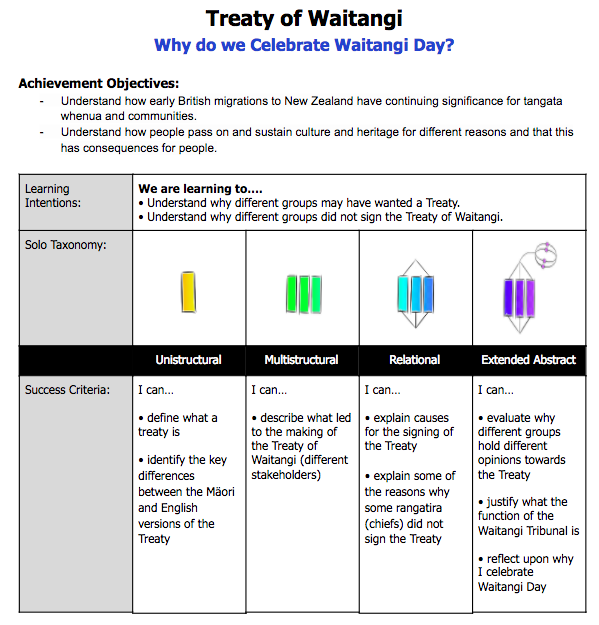
Activities:- Please first complete your Reading Plus InSite test. This should take between 20 and 30 minutes.
- On Google Classroom
, click the 'plus' sign and enter the classroom code: l34sy7z
https://classroom.google.com/u/0/c/NTAyMjEzODk0NzFa
- Read current events articles - 2018 and 2019 Waitangi Day messages (speeches) by Prime Minister Jacinda Adern.
- View the video below...
Waitangi - What Really Happened: Part 1
- Open the document in Google Classroom titled, 'Why do we celebrate Waitangi day?'
and record your name and class.
- View video (as a class) 'The Treaty of Waitangi - An Introduction'.
- Complete questions 1-3 using the link provided and the information learned from the short video and ideas from our shared reading of the school journal 'Te Tiriti o Waitangi' attached below.
- View the A3 hard copy of the Treaty of Waitangi in English, Maori translation, then the Maori version that has been translated into English again. Discuss.
Please complete questions 1-3 for homework. We will finish this document during class time, and 'submit' it on Google Classroom on Wednesday 12th February.
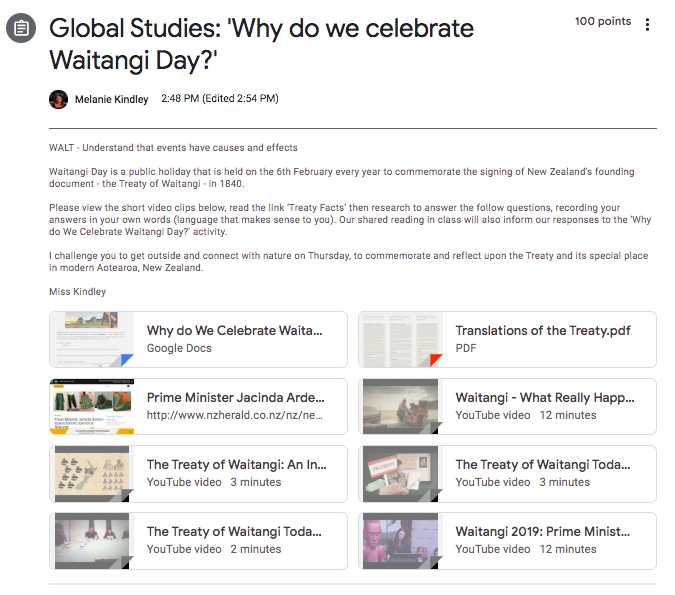
-
- We are DEFINING "What is a Treaty?"
- We are EXPLORING why different groups/stakeholders may have wanted a Treaty.
- We are EXPLORING reasons why some rangatira (chiefs) did not sign the Treaty of Waitangi.
- We are EXPLORING the key differences between the Māori and English versions of the Te Tiriti o Waitangi.
- We are EXPLORING why different groups/stakeholders may have wanted a Treaty.
- We are EXPLORING reasons why some rangatira (chiefs) did not sign the Treaty of Waitangi.
- We are RESEARCHING to place ourselves in the wider context of people and places that represent my whakapapa.
EXPLORE / TŪHURA learning intentions:
Through our learning context ‘Tūrangawaewae - Where do we stand?” we will continue to EXPLORE identity and place through the Māori World View.
Whakataukī: Mā te taiao kia whakapakari tōu oranga ‘Let nature in, strengthen your well-being.’
Authentic Outcomes: Camp Adair, Performance of the 'Kia Mana Ake' school haka, and personal mihi in Te Reo.
UN Goal: #11 ‘Sustainable Communities and Cities’
This week we will complete your 'Why do we celebrate Waitangi Day?' activity then learn how to create a personal mihi/pepeha.
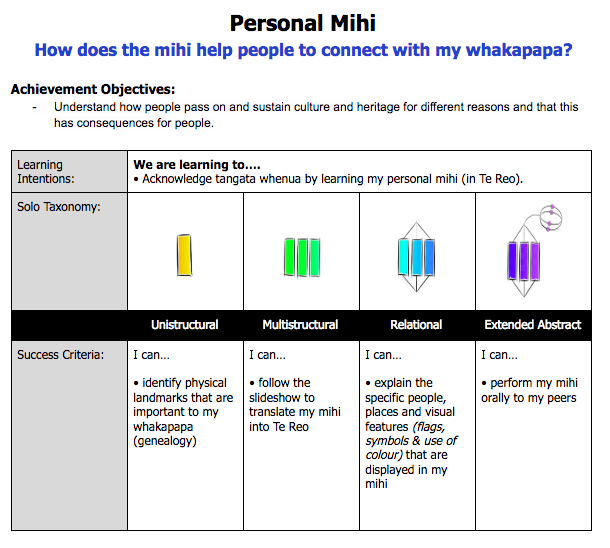
Activities:
1. On Google Classroom, open your 'Why do we celebrate Waitangi Day?' document and complete the chart on Pg 2, to identify the similarities and differences between the English and Maori versions of the Treaty. Highlight which of the 3 articles are 'the same' or 'different'.
2. Complete questions 5 & 6 then revise your document, before 'turning in'.
3. Complete a visual timeline in your exercise books, using pg 16 of the school journal to help you.
4. Speak to your family members about your whakapapa (genealogy) that could be represented in your mihi poster.
5. Read through the slideshow, 'My Mihi - Whakapapa' .
6. View the two exemplars of completed mihi posters. Contribute to the class discussion, what effective visual and verbal features have been used?
7. Write the LI and SC in your Global Studies exercise book.
8. Start developing your personal mihi in your Global Studies exercise book in both English and Te Reo, carefully selecting mountains, oceans, rivers and people that are important to you and to your family.
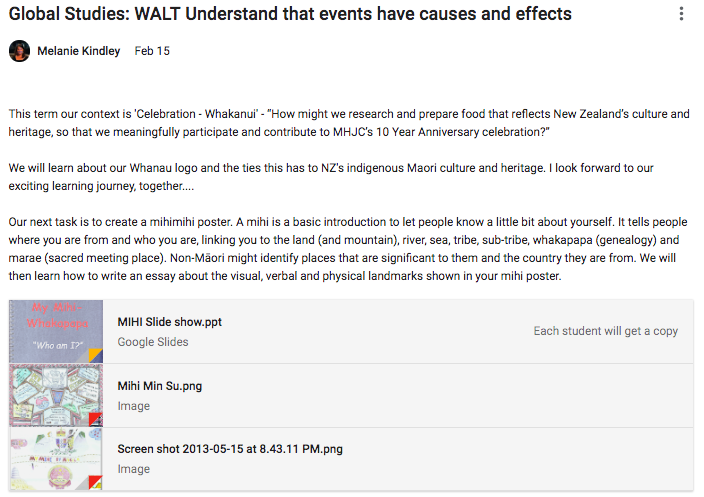
Further Learning: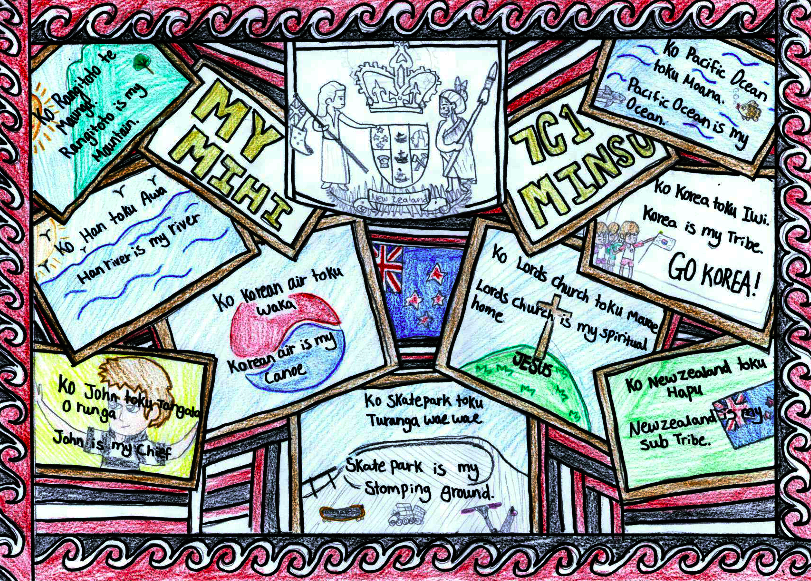
• Please complete your 'Why do we celebrate Waitangi Day?' document during classtime, and 'Turn In' for marking on Wednesday 12th February.
• Speak to your family members about your whakapapa (genealogy) that could be represented in your mihi poster.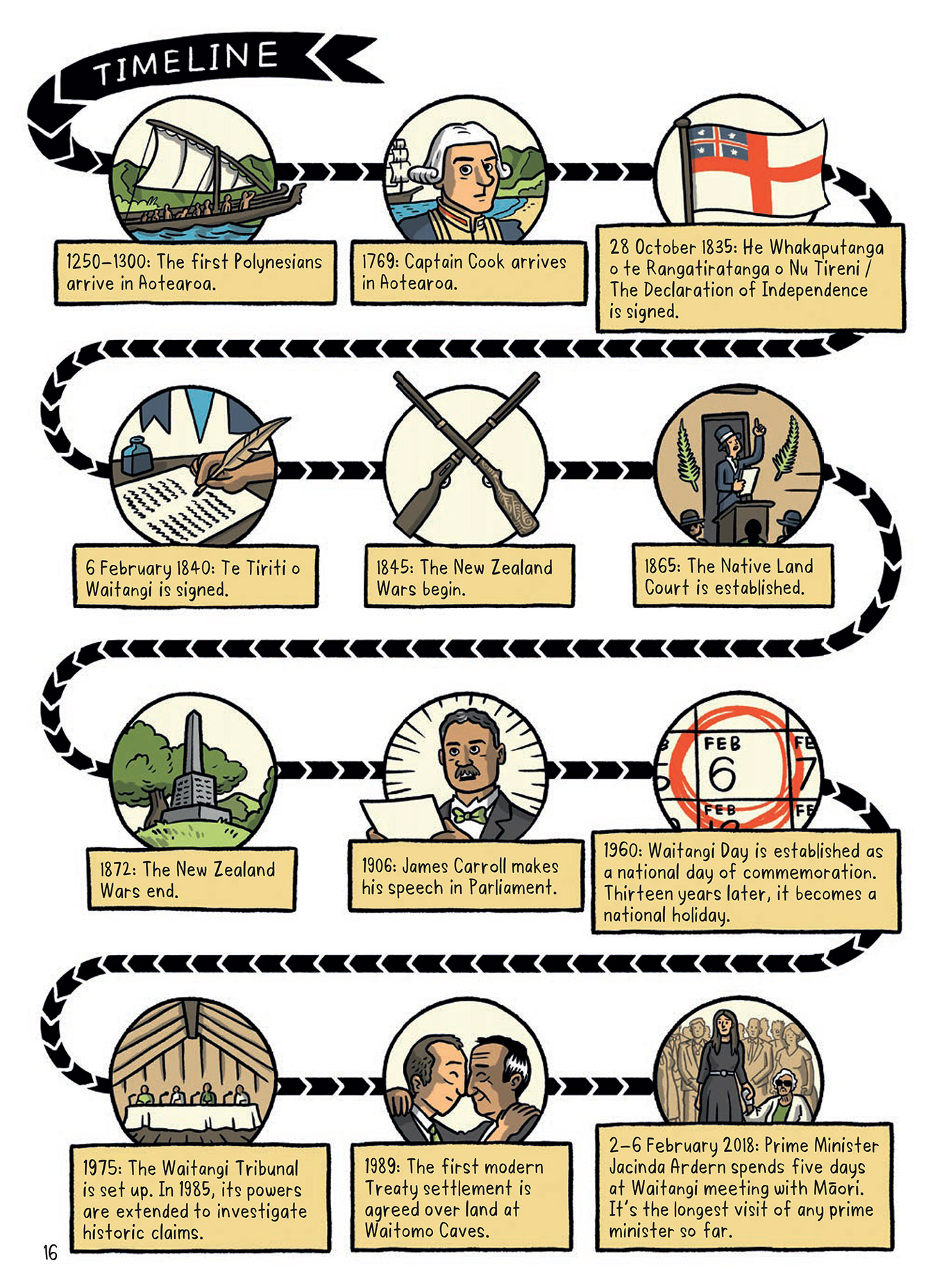
-
EXPLORE / TŪHURA learning intentions:
- We are DEFINING "What is a Treaty?"
- We are EXPLORING why different groups/stakeholders may have wanted a Treaty.
- We are EXPLORING reasons why some rangatira (chiefs) did not sign the Treaty of Waitangi.
- We are EXPLORING the key differences between the Māori and English versions of the Te Tiriti o Waitangi.
- We are EXPLORING why different groups/stakeholders may have wanted a Treaty.
- We are EXPLORING reasons why some rangatira (chiefs) did not sign the Treaty of Waitangi.
- We are RESEARCHING to place ourselves in the wider context of people and places that represent my whakapapa.
Through our learning context ‘Tūrangawaewae - Where do we stand?” we will continue to EXPLORE identity and place through the Māori World View.
Whakataukī: Mā te taiao kia whakapakari tōu oranga ‘Let nature in, strengthen your well-being.’
Authentic Outcomes: Camp Adair, Performance of the 'Kia Mana Ake' school haka, and personal mihi in Te Reo.
UN Goal: #11 ‘Sustainable Communities and Cities’
This week we will start your personal mihi/pepeha slideshows.

Activities:
1. Speak to your family members about your whakapapa (genealogy) that could be represented in your mihi poster.
2. Read through the slideshow, 'My Mihi - Whakapapa' .
3. View the two exemplars of completed mihi posters. Contribute to the class discussion, what effective visual and verbal features have been used?
4. Write the LI and SC in your Global Studies exercise book.
5. Start developing your personal mihi in your Global Studies exercise book in both English and Te Reo, carefully selecting mountains, oceans, rivers and people that are important to you and to your family.
Further Learning:
• Please complete your timeline for homework.
• Speak to your family members about your whakapapa (genealogy) that could be represented in your mihi poster.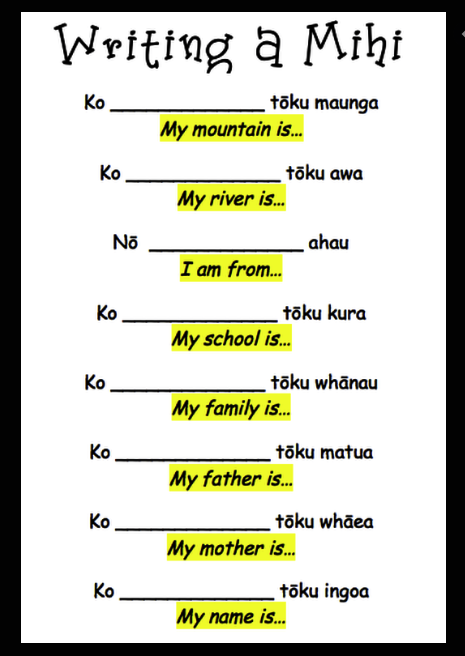
PLAN & DO / WHAKAMAHI learning intentions:
- We are PLANNING for filming (storyboard, script-writing, team roles & responsibilities)
- We are PERFORMING, FILMING and EDITING to tell a sustainability story/message (short film)
- We are COLLABORATING to PUBLISH a sustainability film
-
FOCUS / ARONGA learning intentions:
- We are PRIORITISING and ACKNOWLEDGING tangata whenua by learning our pepeha (in Te Reo).
- We are IDENTIFYING physical and spiritual landmarks that are important to our whakapapa.
- We are EXPLAINING our pepeha/whakapapa to our peers.
- We are FOCUSING on the strong spiritual bonds Māori have with the land - Papatūānuku (the Earth mother).
- We are FOCUSING on the Māori world view of taonga/treasures (such as land, soil and water).
- We are FOCUSING on the Māori concept of kaitiakitanga (guardianship and conservation) of these taonga.
- We are FOCUSING on understanding kaitiakitanga as a source of unity and identity for tangata whenua.
Through our learning context ‘Tūrangawaewae - Where do we stand?” we will continue to EXPLORE identity and place through the Māori World View.
Whakataukī: Mā te taiao kia whakapakari tōu oranga ‘Let nature in, strengthen your well-being.’
Authentic Outcomes: Camp Adair, Performance of the 'Kia Mana Ake' school haka, and personal mihi in Te Reo.
UN Goal: #11 ‘Sustainable Communities and Cities’
This week we will continue your personal mihi/pepeha posters. Please complete your pepeha poster for homework during Weeks 5 and 6 (it is to be handed in after camp.)
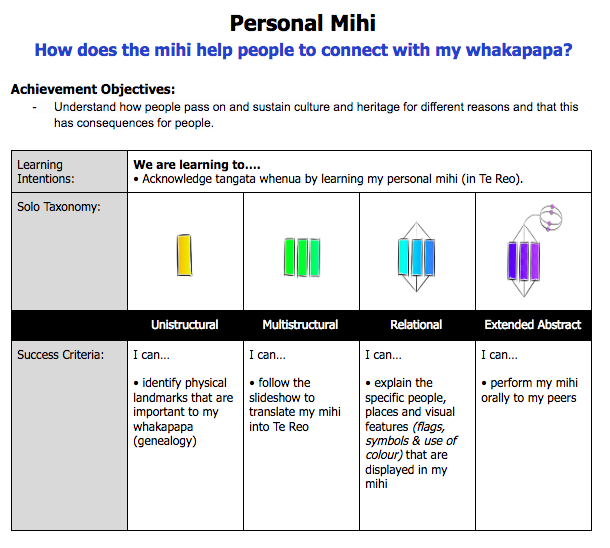
Activities:
1. Speak to your family members about your whakapapa (genealogy) that could be represented in your mihi poster.
2. Read through the slideshow, 'My Mihi - Whakapapa' .
3. View the two exemplars of completed mihi posters. Contribute to the class discussion, what effective visual and verbal features have been used?
4. Write the LI and SC in your Global Studies exercise book.
5. Start developing your personal mihi in your Global Studies exercise book in both English and Te Reo, carefully selecting mountains, oceans, rivers and people that are important to you and to your family.
Further Learning:
• Please complete your timeline for homework.
• Speak to your family members about your whakapapa (genealogy) that could be represented in your mihi poster.
-
FOCUS / ARONGA learning intentions:
- We are PRIORITISING and ACKNOWLEDGING tangata whenua by learning our pepeha (in Te Reo).
- We are IDENTIFYING physical and spiritual landmarks that are important to our whakapapa.
- We are EXPLAINING our pepeha/whakapapa to our peers.
- We are FOCUSING on the strong spiritual bonds Māori have with the land - Papatūānuku (the Earth mother).
- We are FOCUSING on the Māori world view of taonga/treasures (such as land, soil and water).
- We are FOCUSING on the Māori concept of kaitiakitanga (guardianship and conservation) of these taonga.
- We are FOCUSING on understanding kaitiakitanga as a source of unity and identity for tangata whenua.
Activities: Preparing for Camp Adair
1. Read through your 2020 Camp Booklet.
2. Discuss activity groups and cabin groups.
3. View the camp programme and activity rotation documents.
4. Prepare for camp, using the Camp Gear List for packing.
5. Please hand in any medicine to Miss Kindley, on Wednesday morning in a named plastic bag.
6. Reflect, what are the skills and dispositions that are required for a successful camp? (Leadership, friendship, collaboration and problem-solving).
Further Learning:
• Please pack for Camp Adair! My very best wishes for a happy, safe and memorable camp. 😃👍
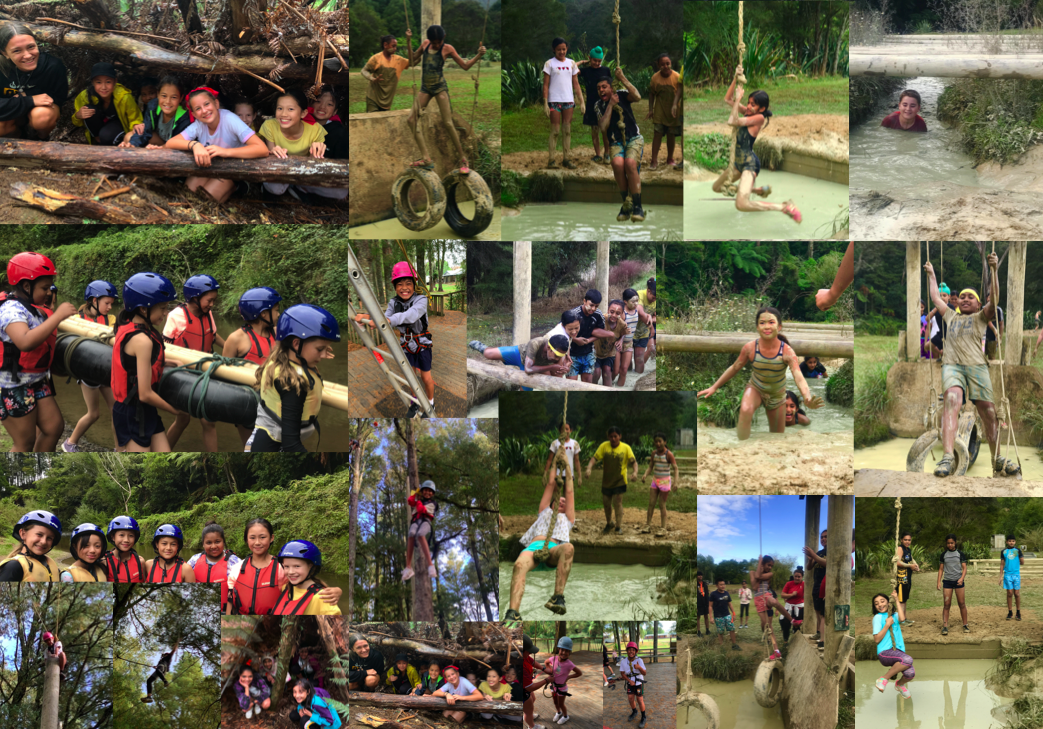
-
FOCUS / ARONGA learning intentions:
- We are PRIORITISING and ACKNOWLEDGING tangata whenua by learning our pepeha (in Te Reo).
- We are IDENTIFYING physical and spiritual landmarks that are important to our whakapapa.
- We are EXPLAINING our pepeha/whakapapa to our peers.
- We are FOCUSING on the strong spiritual bonds Māori have with the land - Papatūānuku (the Earth mother).
- We are FOCUSING on the Māori world view of taonga/treasures (such as land, soil and water).
- We are FOCUSING on the Māori concept of kaitiakitanga (guardianship and conservation) of these taonga.
- We are FOCUSING on understanding kaitiakitanga as a source of unity and identity for tangata whenua.
Activities: Publishing my Pepeha Poster
1. 'Do Now Task': Current Events
2. Conferencing with the teacher - planning of your Pepeha Poster in your exercise books. Check-listing: have you used symbols, colour, geographical features, and Te Reo?
3. Publishing onto A3 paper.
Further Learning:
• Please work on your A3 Pepeha poster for homework. Your poster is due on Friday 20th March.
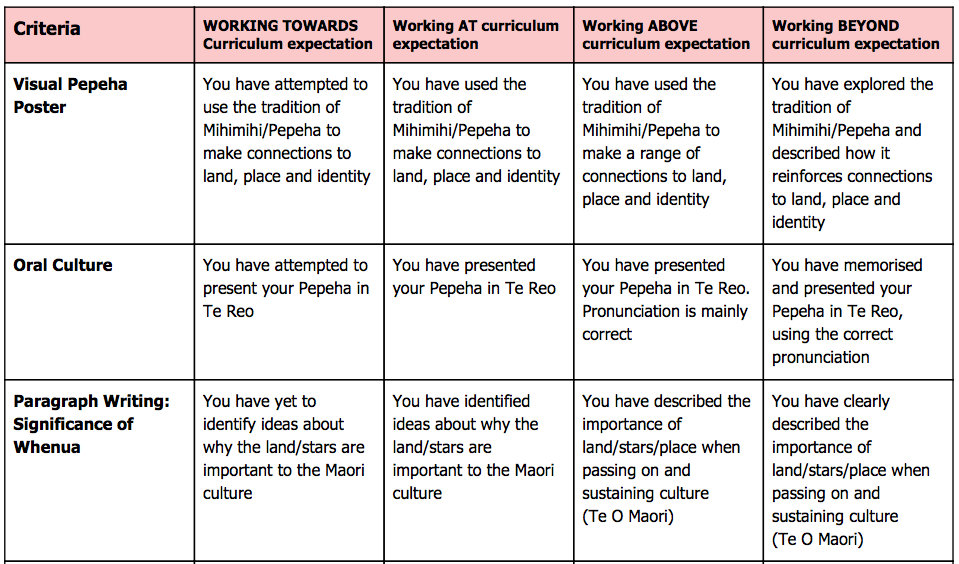
-
FOCUS / ARONGA learning intentions:
- We are PRIORITISING and ACKNOWLEDGING tangata whenua by learning our pepeha (in Te Reo).
- We are IDENTIFYING physical and spiritual landmarks that are important to our whakapapa.
- We are EXPLAINING our pepeha/whakapapa to our peers.
- We are FOCUSING on the strong spiritual bonds Māori have with the land - Papatūānuku (the Earth mother).
- We are FOCUSING on the Māori world view of taonga/treasures (such as land, soil and water).
- We are FOCUSING on the Māori concept of kaitiakitanga (guardianship and conservation) of these taonga.
- We are FOCUSING on understanding kaitiakitanga as a source of unity and identity for tangata whenua.
Activities: My Pepeha Essay - Learning to write 'SEXY' paragraphs
1. 'Do Now Task': Shared Reading of Gavin Bishop's 'How Maui Slowed the Sun'
Class discussion:
• What are creation myths - what's their purpose? (...to explain a range of natural phenomenon, how things 'came to be' eg. islands pulled from the sea, tides, the sun, fire)
• What is a demigod? • What character traits can we associate with Maui?
• What do we learn about the Māori way of doing things (tikanga) by reading their myths and legends?
• Two important aspects of tikanga we should be aware of are Manaakitanga and Kaitiakitanga.Manaakitanga - hospitality and kindness.
Kaitiakitanga - is the strong sense of respect and guardianship Māori have for the natural environment. Related concepts are mana, tapu and mauri.
Here is a digital version of this myth, by Peter Gossage 'How Maui Slowed the Sun.'
2. Now let's make an intertextual connection to a modern-day retelling of the feats that made Maui famous - Moana (both the Te Reo Māori and Hawaiian word for ocean). The protagonists in the movie 'Moana' is Maui who is based on a real mythic figure who played a major role in Maori mythology. One way in which Disney's Maui differs from the traditional portrayal of the demigod is that they make him an orphan. Traditionally though, Maui has three brothers and a trickster son or stepson.Here is the catchy Disney musical number where we hear about the feats that made Maui famous, 'You're Welcome!'
3. In Moana, Maui uses his fish hook to turn himself into different creatures and defeat his enemies and adversaries. In traditional Maori lore, Maui did indeed have a fish hook. He used this to pull up the pacific islands from which Polynesia derives its name — Polynesia literally means “many islands.” A couple of these islands just so happened to be modern-day New Zealand. Maui used his fish hook to pull up a huge fish one day and that fish became the North Island.
4. Shared class reading of Peter Gossage's 'The Fish of Maui'
5. Many Māori traditions show a close, mystical relationship between humans and nature. In Māori culture, humans are seen as deeply connected to the land and to the natural world. Kaitiakitanga grows out of this connection (guardianship and protection).
6. Read through 'My Pepeha Paragraph Scaffold' document, below...
7. In groups, research and share brief definitions for the following 12 terms as this will assist you when you start to write your Pepeha essay.
- Māori
- identity
- pepeha
- sustain
- tūrangawaewae
- bi-cultural
- spiritual
- taonga
- whakapapa
- geneology
- world view
- kaitiakitanga
8. Visit Tane Forest to connect with our Papatūānuku (the Earth mother). - Wednesday (social action).
9. Write SEXY paragraphs in exercise books. Publish finished essay onto Google Classroom, with scanned jpeg of your Pepeha Poster at the base of your writing. 'Turn In' to Google Classroom once edited.
Further Learning:
• Please work on your A3 Pepeha poster for homework. Your poster is due on Friday 20th March.
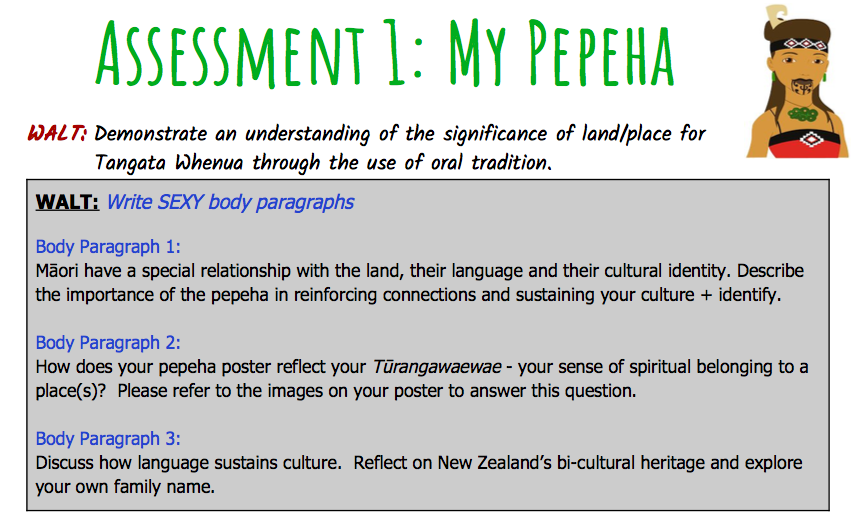
-
PLAN & DO / WHAKAMAHI learning intentions:
- We are PLANNING our essay using a writing scaffold
- We are CONSULTING with family members to learn more about family ancestry/whakapapa and experiences
- We are APPLYING the SEXY acronym to structure our paragraph writing
- We are PERFORMING our Pepeha, in PREPARATION for SHARING
Success Criteria:
• I can identify what the SEXY acronym stands for in paragraph writing
• I can attempt to apply the SEXY paragraph strucutre to my writing
• I can learn (memorise) my personal pepeha in Te Reo
• I can submit my completed Pepeha poster for marking
• I can retrieve information from a range of sources to respond to 7F1's Current Events Quiz
Activities: My Pepeha Poster, Essay and Oral Delivery (to friends)
1. 'Do Now Task': Please complete Week 8's 'General Knowledge Quiz' using Google Forms. I am happy for you to research and read to locate answers + deepen your understanding.
2. Please finish writing P3 and the conclusion for their Pepeha essay, in your exercise books. You can copy much of this from the scaffolded essay resource on Google Classroom, and attached below. You have already done this for their introduction, P1 and P2.3. Fast finishers, please practice (memorise) your Pepeha from Page 12 of your slideshow on Google Classroom. You can do this in the central Whanau space, if you prefer.4. Fun fact - Analysis of Maori Music videos that topped the music charts (past and present) -https://www.nzherald.co.nz/entertainment/news/article.cfm?c_id=1501119&objectid=11486484
Further Learning:
• Please hand in your completed Pepeha Poster to my office (place on my desk). Thank you! 😀

-
Welcome back from the school holidays everyone! We're going to be practicing our distance learning for the first two weeks of the term.... 🏘
Please follow your school timetable, check your emails at least twice a day and keep in touch with your teachers.
Our Global Studies work will simply involve finishing the 'Assessment 1' activities that we have already made a good start on together, prior to the holidays. There is no rush, or need to panic. I am here to support you with these 3 tasks...
a) Draw a Pepeha Poster, b) Learn your Pepeha and recite it orally, c) Use the essay scaffold on Google Classroom to finish your SEXY Pepeha paragraphs (essay). You are being asked to type this onto Google Classroom.We will also hold a fun 'live' Kahoot quiz each Wednesday at 9:30am via Google Meet - there are prizes that will be redeemed upon our return to school, so please do your best to connect. I will copy and paste the Google Meet link into an email and send it to all students in 7F1 at 9:25am each Wednesday morning. This will also be a really nice time to say 'hi', to ask any questions and to look after each other! If you do not have access to a phone or computer that has a camera, do not worry! I will simply post the Kahoot quiz for you to complete on Google Classroom.
Take care, and please be kind and responsible when online. Please also remember to send me an email about any 'school troubles', as I do not want you to worry about any class work. 💚
Miss Kindley 👋😃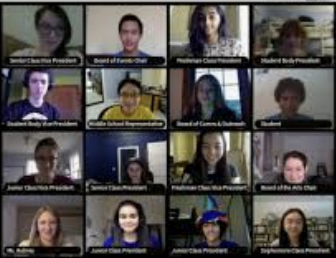
PLAN & DO / WHAKAMAHI learning intentions:
- We are PLANNING our essay using a writing scaffold
- We are CONSULTING with family members to learn more about family ancestry/whakapapa and experiences
- We are APPLYING the SEXY acronym to structure our paragraph writing
- We are PERFORMING our Pepeha, in PREPARATION for SHARING
Success Criteria:
• I can identify what the SEXY acronym stands for in paragraph writing
• I can attempt to apply the SEXY paragraph structure to my writing
• I can learn (memorise) my personal pepeha in Te Reo
• I can submit my completed Pepeha poster for marking
• I can retrieve information from a range of sources to respond to 7F1's Weekly Current Events Quiz
Activities: Distance Learning
1. Please ensure you work to finish your Pepeha poster during our distance learning period. Although this was due prior to the start of the lock-down, I am very happy to collect these in once we return back to school. If you have lost your original work or do not have A3 paper at home, please don't worry. You can use any paper you can find at home. 🙂👍
2. Go to page 12 of your Pepeha slideshow on Google Classroom. Type in the name of your mountain, river, ocean, etc if you have not already done so. Practice reading this out loud - your challenge is to learn your pepeha off by heart. 🤩
3. Go to Google Classroom. Use the essay scaffold to continue your SEXY paragraphs about your Pepeha poster. Remember, we have already made a very good start on this during class time, in your exercise books. Please have a look for your exercise book in your school bag, and type this onto the template on Google Classroom.
4. Keep up to date with current events - please try to join me at 9:30am on Wednesday mornings for a catch-up + fun quiz.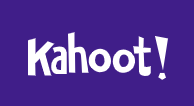
If you missed our 'Google Meet' session on Wednesday, you can play Week 1's game here!
5. Any questions? Please do not hesitate to send me an email. I'm here to help if things sound tricky.... relax, there is no pressure. We're just continuing the work we have already started...
Thank you and I shall look forward to chatting to you during our fun 'video-chat' Kahoot quiz this Wednesday 15th April, at 9:30am! 😀

-
Welcome to Week 2 's distance learning in Global Studies. I hope you are safe, well and looking forward to some fun learning challenges this week.... 🏘
Thank you for following your school timetable and checking your emails at least twice a day and keep in touch with your teachers.
PLAN & DO / WHAKAMAHI learning intentions:
- We are PLANNING our essay using a writing scaffold
- We are CONSULTING with family members to learn more about family ancestry/whakapapa and experiences
- We are APPLYING the SEXY acronym to structure our paragraph writing
- We are PERFORMING our Pepeha, in PREPARATION for SHARING
Success Criteria:
• I can identify what the SEXY acronym stands for in paragraph writing
• I can attempt to apply the SEXY paragraph structure to my writing
• I can retrieve information from a range of sources to respond to 7F1's Weekly Current Events Quiz
• I can participate in ANZAC remembrance activities, to help remember and record the past in different ways
Activities: Distance Learning
1. Your Pepeha poster and oral practice of your Pepeha should now be complete. (If not, please note these on the top of your 'To Do!' list). 🙂👍
2. Keep up to date with current events - please try to join me on 'Google Meet' at 12:00noon on Monday 20th April, for a catch-up + fun quiz.
If you miss our 'Google Meet' session, you can play Monday's fun class quiz yourself, here...
3. Select four fun Anzac Day activities to complete from the poster below. The activities do not all need to be in the same row - you're free to choose! You will be sharing a description of the activities you completed as a part of our classwork next week. We will also be exploring Anzac Day further during Global Studies next week. Remember to take photos or record down links to website resources and activities etc, as evidence.
4. Go to Google Classroom. Use the essay scaffold to continue your SEXY paragraphs about your Pepeha poster. Remember, we have already made a very good start on this during class time, in your exercise books. Please have a look for your exercise book in your school bag, and type this onto the template on Google Classroom. If you have left your exercise book at school, please view the video link here, as this will certainly help you.
5. Any questions? Please do not hesitate to send me an email. I'm here to help if things sound tricky.... relax, there is no pressure or rush.
Thank you and I shall look forward to chatting to you during our fun 'video-chat' Kahoot quiz on Monday @ 12noon!
Miss Kindley 👋😃
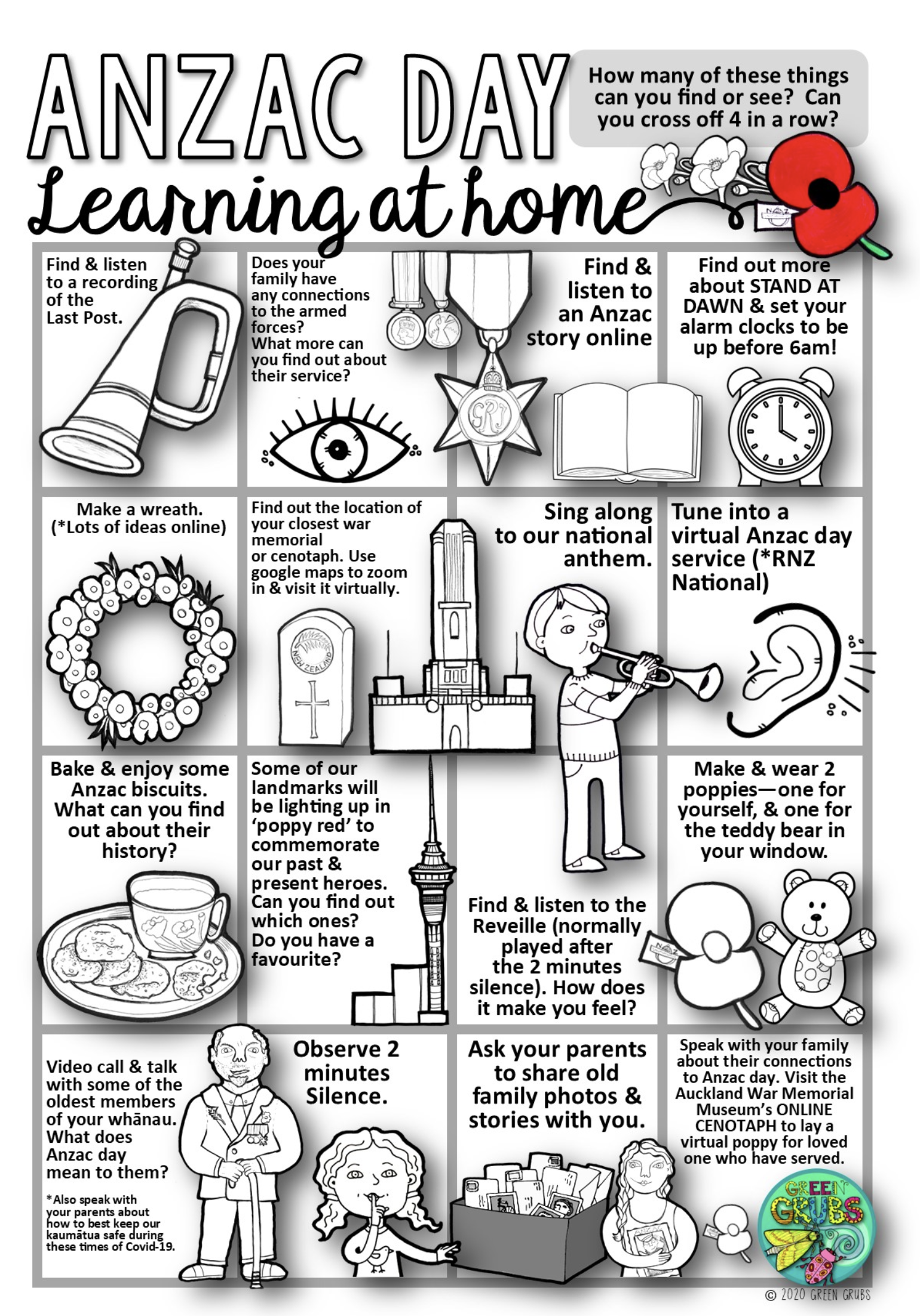
-
Welcome to Week 3's distance learning in Global Studies. This week you will be uploading your finished pepeha essay along with a photo of your pepeha poster at the bottom of it, as a pdf document to Mission Heights Online. 🏘
You can also choose a way to share your oral pepeha with me: thank you for emailing me a short video clip, a sound recording or book in a video meeting. You choose!
Thank you for continuing to follow your school timetable and checking your emails at least twice a day + keep in touch with your teachers.
REFLECT / WHAIWHAKAARO learning intentions:
- We are completing a self REFLECTION on our oral/written & visual Pepeha, to identify successes and 'next learning steps'
- We are reading and applying feedback to enhance our work for 'resubmission'.
Success Criteria:
• I can identify what the SEXY acronym stands for in paragraph writing
• I can attempt to apply the SEXY paragraph structure to my writing
• I can retrieve information from a range of sources to respond to 7F1's Weekly Current Events Quiz
• I can participate in ANZAC remembrance activities, to help remember and record the past in different ways
Activities: Distance Learning
1. Please finish writing your Pepeha essay onto document 'B' on our Google Classroom page. Insert a photo of your finished poster at the base of your essay. (*I will take photos of the posters that were left on my desk and email them out to students, as I return to school on Wednesday 29th April). 🙂👍
2. Video conferencing. Please try to join me on 'Google Meet' at 11am on Tuesday 28th April, for a catch-up + a quick hello to some of your teachers who have returned to school.
3. Any questions? Please do not hesitate to send me an email. I would like us to aim to have our Term 1 Assessment handed in by Friday 1st May, please. I will post a video here to show you how to download your essay as a pdf, and upload/submit it to MH Online for marking.
Thank you and I shall look forward to chatting to you during our fun 'video-conference' + Kahoot quiz on Tuesday at 11am.
Miss Kindley 👋😃
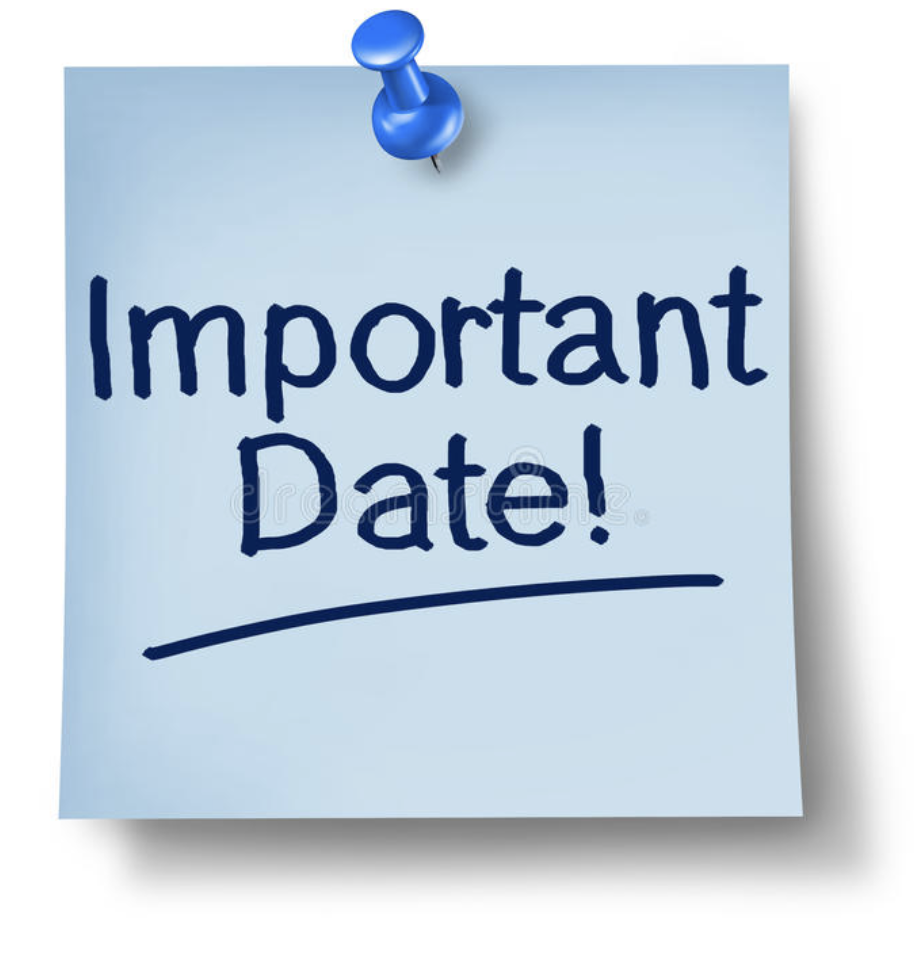
-
Welcome to Week 4's distance learning in Global Studies. This week you will be completing a self-reflection document and sharing evidence of your ANZAC Day tasks.
You can also choose a way to share your oral pepeha with me: thank you for emailing me a short video clip, a sound recording or book in a video meeting. You choose!
Thank you for continuing to follow your school timetable and checking your emails at least twice a day + keep in touch with your teachers.
REFLECT / WHAIWHAKAARO learning intentions:
- We are completing a self REFLECTION on our oral/written & visual Pepeha, to identify successes and 'next learning steps'
- We are reading and applying feedback to enhance our work for 'resubmission'.
Success Criteria:
• I can retrieve information from a range of sources to respond to 7F1's Weekly Current Events Quiz
• I can reflect on my learning, to identify my 'next steps'
• I can participate in ANZAC remembrance activities, to help remember and record the past in different ways
Activities: Distance Learning
1. Thank you and well done to all students who have uploaded their finished essay + inserted photo of your Pepeha poster as a pdf to MH Online. 🙂👍
2. Keep up to date with current events - please try to join me on 'Google Meet' at 12 noon on Monday 4th, for a catch-up + fun quiz.
If you miss our 'Google Meet' session, I will post a link (here) to the quiz for you to complete in your own time during the week.
3. Complete the Pepeha Self-reflection + Anzac Day document on Google Classroom. Add evidence such as photos, screenshots, links to research/resources and/or drawings to show the 4 activities you participated in to commemorate Anzac Day this year .
Thank you and I shall look forward to chatting to you during our fun 'video-conference' + Kahoot quiz on Monday at 12 noon.
Miss Kindley 👋😃
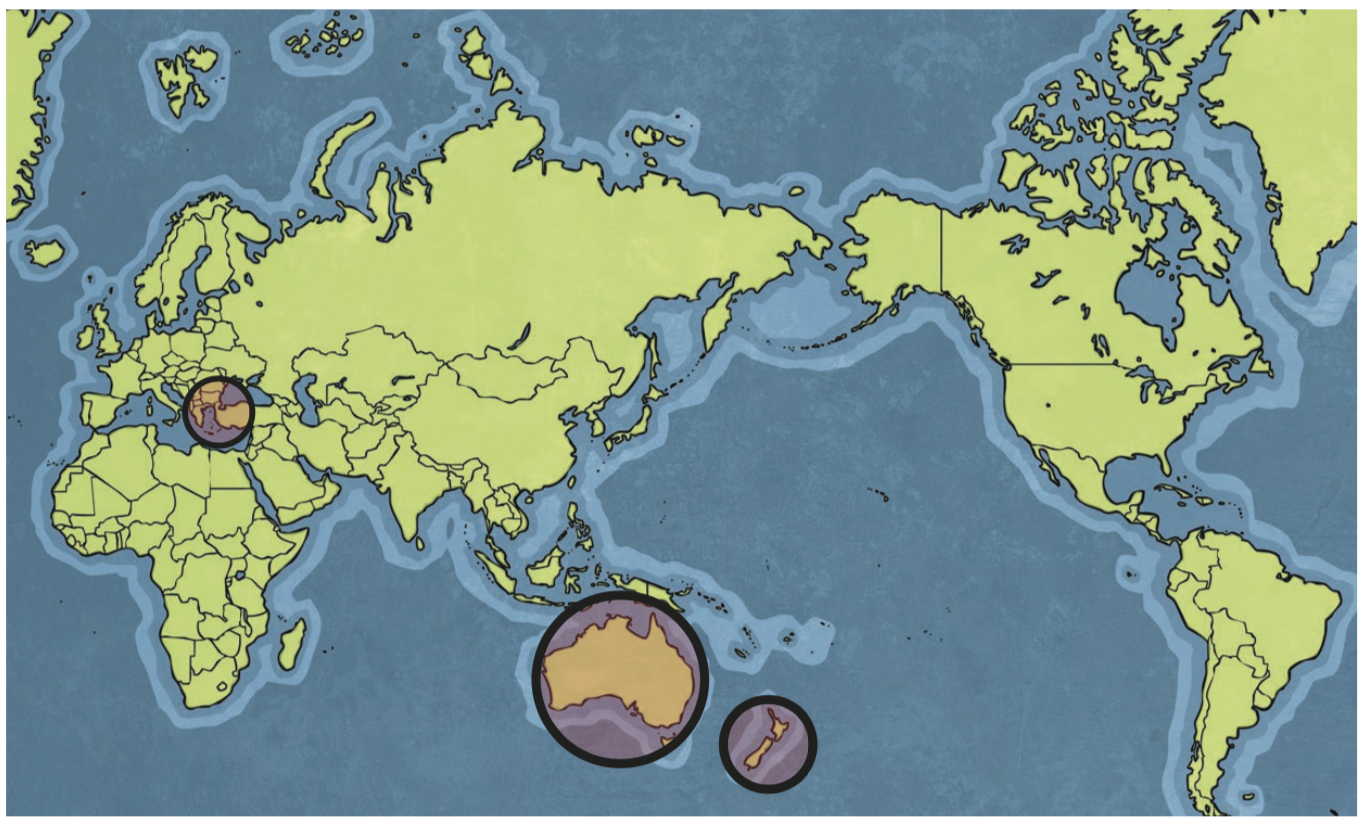
-
Welcome to Week 5's distance learning in Global Studies. This week you will be completing several aspects of your digital citizenship ePassport and uploading evidence to your Great Learner Evidence Website.
Thank you for continuing to follow your school timetable and checking your emails at least twice a day + keep in touch with your teachers.
REFLECT / WHAIWHAKAARO learning intentions:
- We are REFLECTING on our capability in using digital technologies to achieve desired outcomes
- We are COLLECTING evidence of our learning for display on our Great Learner Evidence Websites
Success Criteria: 'I am a digitally fluent student, because...'
- I can find and access information quickly and accurately
- I can critique the relevance and accuracy of information
- I can produce and organise digital content
- I can consistently use digital technologies responsibly including social media, digital security (self-protection) and copyright
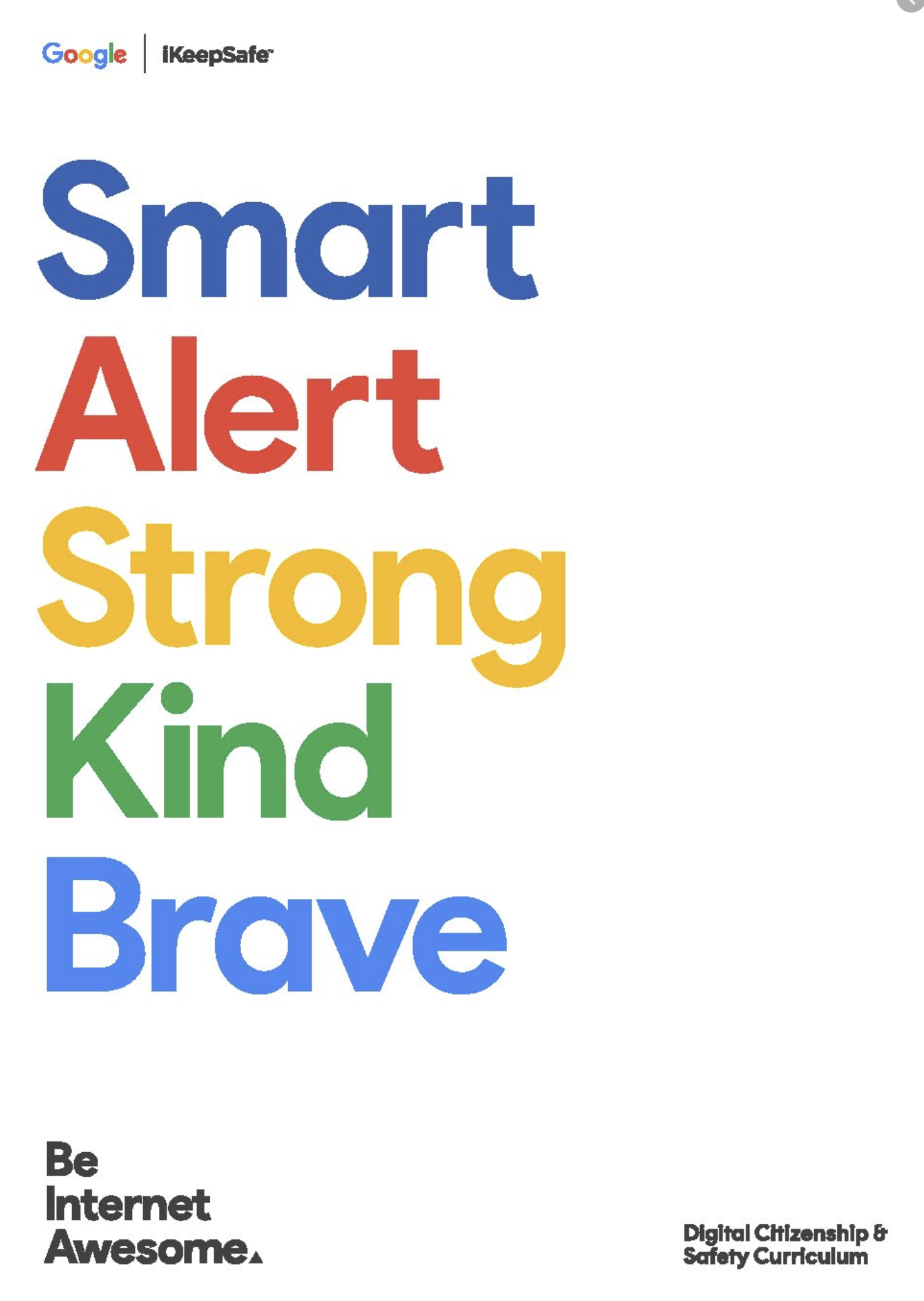
Activities: Our ePassport activities will be discussed during our Google Meet session at 12 noon on Monday 11th May.
1. On Monday, please navigate to our Google Classroom page. Click on 'Classwork' then the 'eLearning' tab 🙂👍
2. As a class, we will read through the 1. Home page, 2. the Organisation tasks link and 3. finally the Cyber safety tasks link.
3. Please create a 2020 folder in your Google Drive, then subfolders for each subject. Please also create an ePassport evidence folder, with the headings Bronze, Silver, Gold, and Platinum. Once you have filed your class documents, take an evidence 'screenshot' to show that you are well organised - this is your 'Bronze Badge' evidence.
4. Start your Interland Games, to learn more about cyber safe behaviours that we require of you at MHJC. Take a screenshot of each of the 5 certificates you are required to earn and file these into your 'Silver Badge' evidence folder.
5. On Tuesday 12th May we will have our second Google Meet video conference at 11am. You will start to collect screenshot evidence of your Digital Capability tasks in your folder labelled, eg. use of Google Slides, Google Sites, Google Sheet, Google Calendar, etc. File these into your 'Gold Badge' folder.
I am sure that you will really enjoy earning your ePassport eBadge this year. I shall look forward to talking to you during our two Google Meet 'video-conference' sessions this week.
Miss Kindley 👋😃
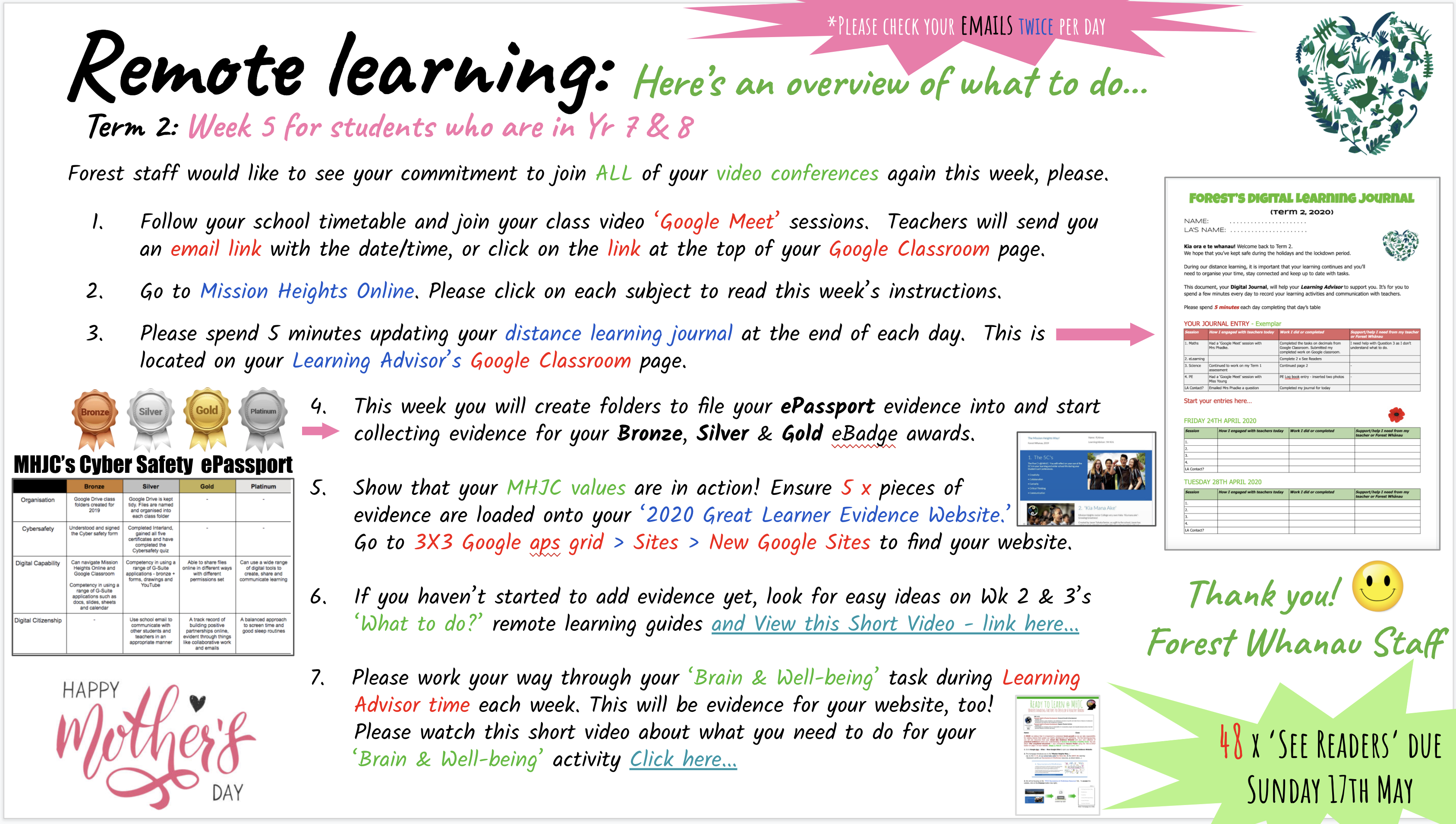
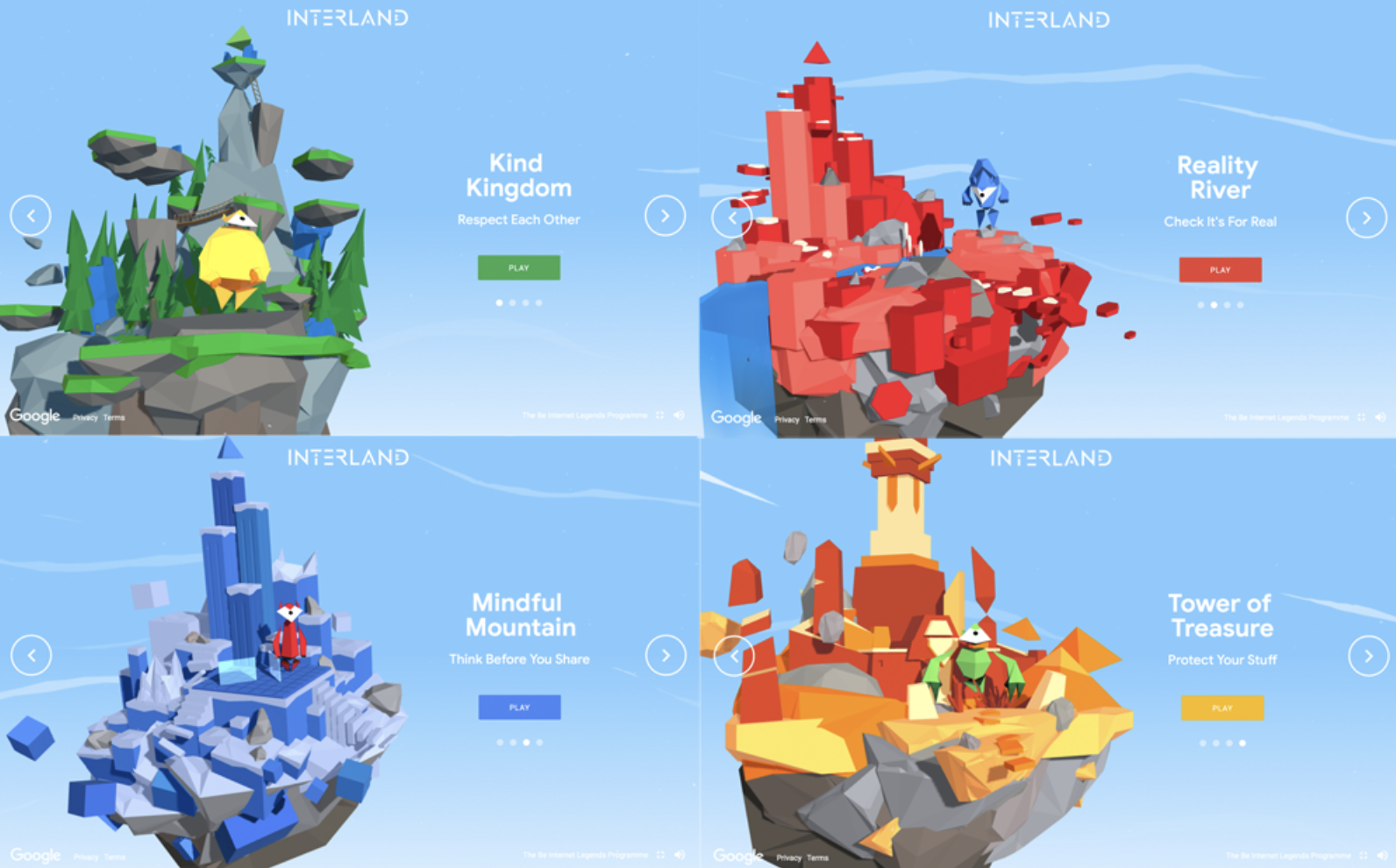
-
Welcome back to school everyone - we have certainly missed you! This week we will be starting our new context titled, 'The Outlook for Someday'.🌴
EXPLORE / TŪHURAlearning intentions:
- We are EXPLORING the 4 pillars of sustainability
- We are EXPLORING issues in terms of a sustainable world
- We are EXPLORING various issues and making decisions about possible actions
Success Criteria:- I can define sustainability
- I can discuss the four pillars or lenses of sustainability
- I can discuss issues, in terms of a sustainable world
Activities:
1. Check-pointing: Individual conferencing with Miss Kindley to ensure all components of Assessment 1 have been completed: A. Pepeha Poster, B. Pepeha Essay, C. Oral Pepeha presentation and D. Reflection are all finished. Have you E. uploaded your finished assessment as a pdf to MH Online?
2. As a class, we will access resources for our second context from Google Classroom (also shown below). 7F1 will complete a shared class reading and discussion of 'The Outlook for Someday Management Plan.'
3. Completion of activities relating to the 'cultural pillar' of sustainability, and what this looks like at MHJC. (Kia Mana Ake!)
Further Learning: Homework
Please ensure all aspects of your Pepeha assessment have been finished and check-listed with Miss Kindley.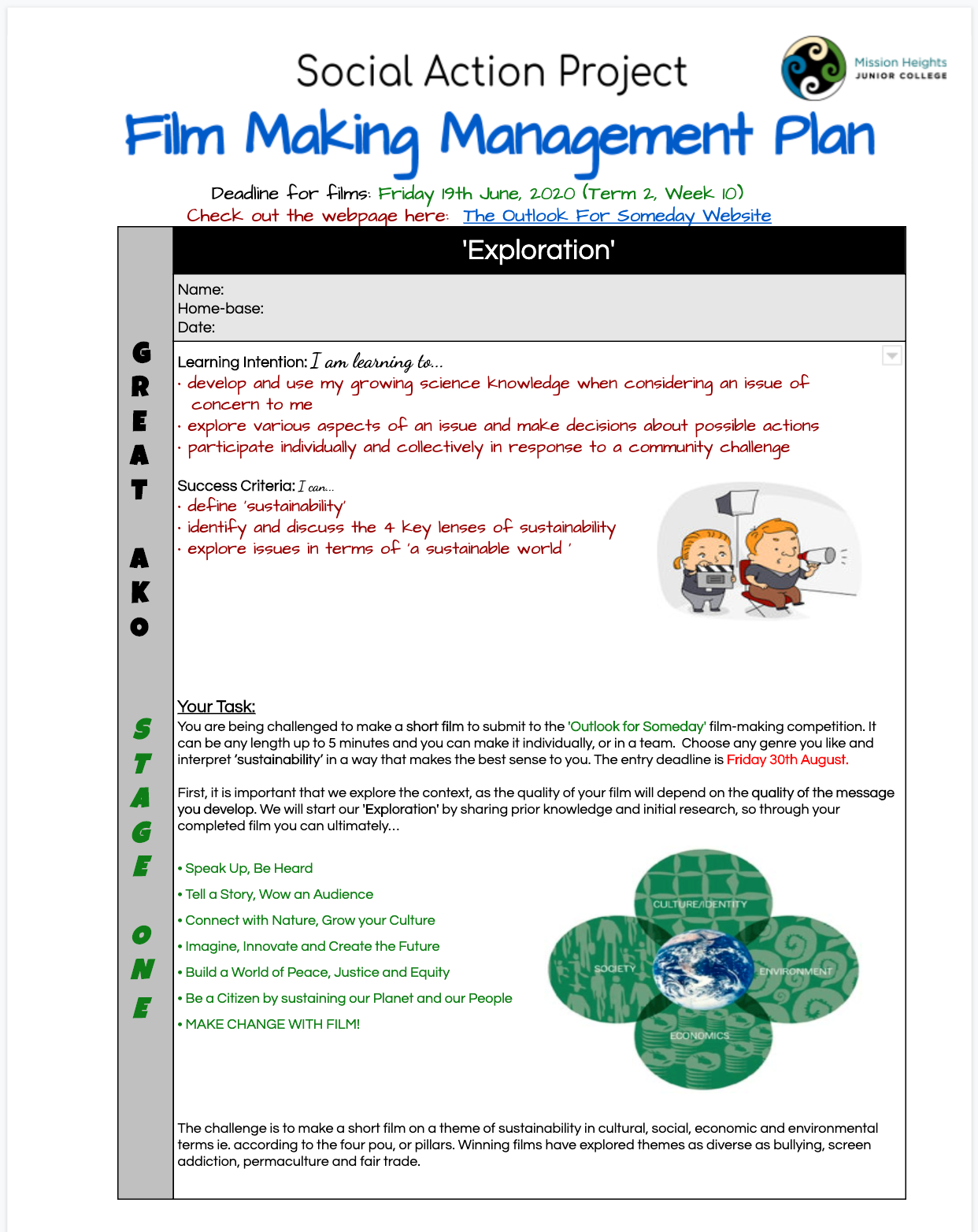
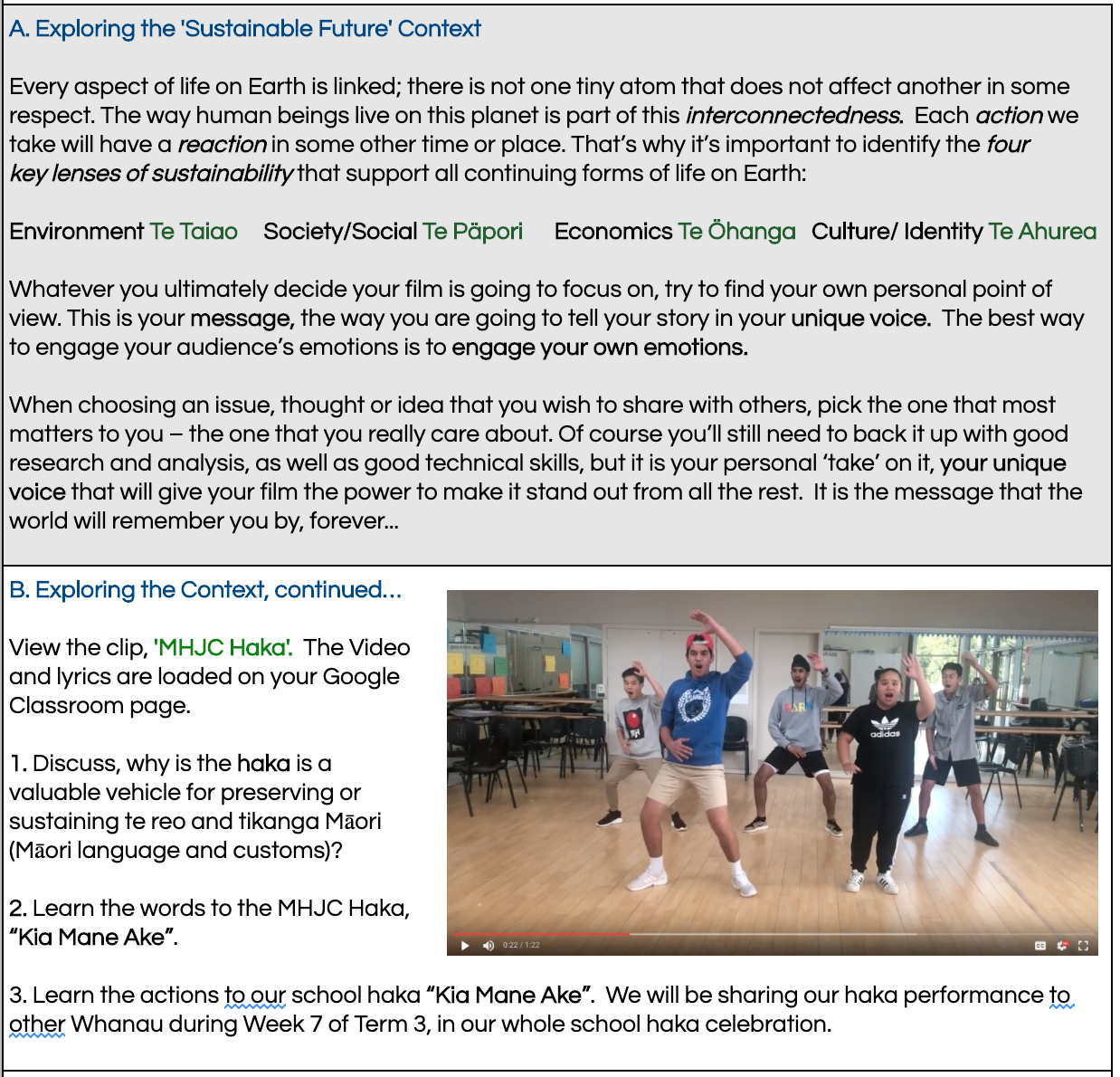
Wishing you a lovely week!
Miss Kindley 👋😃
-
Kia ora 7F1, this week will continue to explore the cultural pillar/pou of sustainability through 'The Outlook for Someday' Management Plan. 🌴
EXPLORE / TŪHURAlearning intentions:
- We are EXPLORING the 4 pillars of sustainability
- We are EXPLORING issues in terms of a sustainable world
- We are EXPLORING various issues and making decisions about possible actions
Success Criteria:- I can define sustainability
- I can discuss the four pillars or lenses of sustainability
- I can discuss issues, in terms of a sustainable world
Activities:
1. Group practice of the 'Kia Mana Ake' haka. Learning of the lyrics first, then the actions.
3. Completion of activities relating to the 'cultural pillar' of sustainability, and what this looks like at MHJC. (Kia Mana Ake!)
Further Learning: Homework
Please refer to the video clip and lyrics below, and practice the school haka for homework.
Have a fabulous week!
Miss Kindley 👋😃
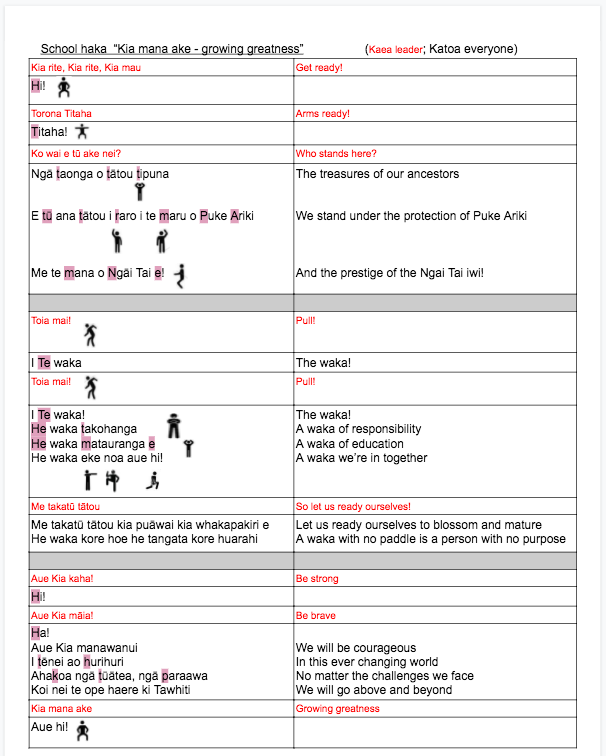
-
Kia ora 7F1, this week will add evidence from our Global Studies learning to our Great Learner Evidence Websites. 🌴
EXPLORE / TŪHURAlearning intentions:
- We are EXPLORING the 4 pillars of sustainability
- We are EXPLORING issues in terms of a sustainable world
- We are EXPLORING various issues and making decisions about possible actions
- We are EXPLORING Maori concepts of Whakamana (Ako + Wananga), Pono & Awinatanga
Success Criteria:- I can define sustainability
- I can discuss the four pillars or lenses of sustainability
- I can discuss issues, in terms of a sustainable world
- I can locate evidence of MHJC's Values-in-Action through my school and distance learning
Activities:
1. Open your 'Great Learner Evidence Website'. This is located in Google Aps > Sites > New Google Sites
2. Add bullet-pointed descriptions of 'what', 'when', and 'how' under your photos/screenshots of our school values-in-action. The image below shows our values in Te Reo and the translated meanings...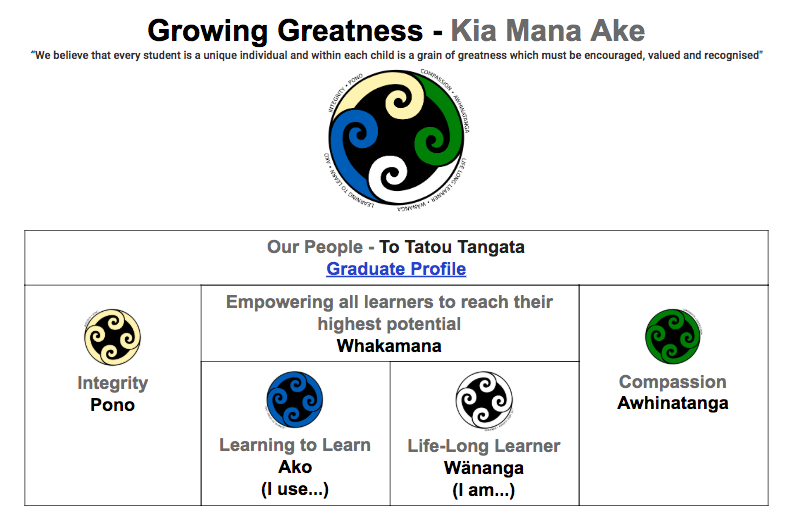
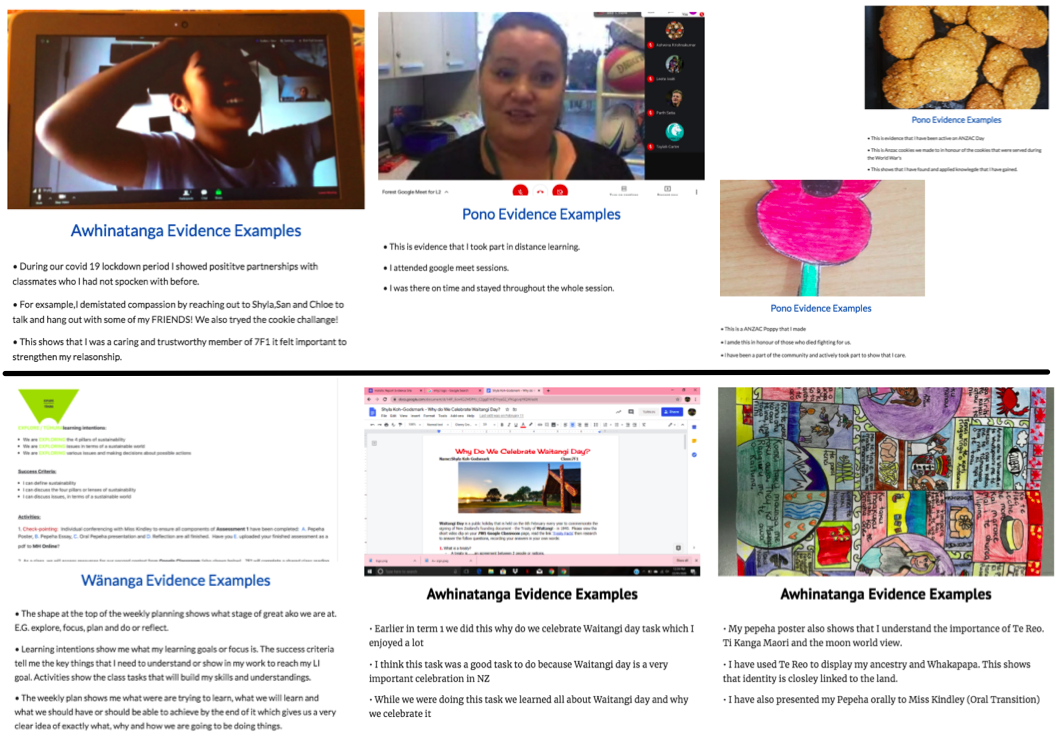
Further Learning: Homework
Please edit your bullet-pointed descriptions, being mindful that the evidence you load to your evidence website needs to match the criteria. Check, have I used the key-words in my writing? Remember to use the phrase, "This shows that I ...."
Have a fabulous week!
Miss Kindley 👋😃
-
Kia ora 7F1, this week will explore the economic pillar/pou of sustainability through 'The Outlook for Someday' Management Plan. 🌴
EXPLORE / TŪHURAlearning intentions:
- We are EXPLORING the 4 pillars of sustainability
- We are EXPLORING issues in terms of a sustainable world
- We are EXPLORING various issues and making decisions about possible actions
Success Criteria:- I can define sustainability
- I can discuss the four pillars or lenses of sustainability
- I can discuss issues, in terms of a sustainable world
Activities:
1. View 'The Story of Stuff'.
2. In exercise books, complete in-class definitions (planned obsolescence and perceived obsolescence) plus note-taking activities.
- Draw 'The Materials Economy' - a linear system in crisis, in exercise books.
- Wednesday: Complete a second viewing of the video 'The Story of Stuff' to answer the research questions and response tasks on the Google Classroom task, Great Ako - Exploring: 'The Story of Stuff' - Economic & Environmental Lenses of Sustainability.
Further Learning: Homework
Please complete the 'The Story of Stuff' activity for homework.
Have a happy week, everyone!
Miss Kindley 👋😃
-
This week the film, 'A Plastic Ocean' will help us to explore sustainability through an environmental lens.
EXPLORE / TŪHURAlearning intentions:
- We are EXPLORING the 4 pillars of sustainability
- We are EXPLORING issues in terms of a sustainable world
- We are EXPLORING various issues and making decisions about possible actions
- We are EXPLORING Maori concepts of Whakamana (Ako + Wananga), Pono & Awinatanga
Success Criteria:- I can define sustainability
- I can discuss the four pillars or lenses of sustainability
- I can discuss issues, in terms of a sustainable world
- I can locate evidence of MHJC's Values-in-Action through my 'Sustainability' learning journey
- I can understand the impact of single-use plastics on the marine environment
- I can describe the impact of humans on the marine environment

Activities:
- View the video 'A Plastic Ocean'. This will take 2 sessions.
- In exercise books, complete in-class note-taking activity.
- Reflection upon our own lunch-boxes. How much plastic do we use? Could we do better?
- Reflection upon the blue whale that introduces and concludes the film, 'A Plastic Ocean'. An exploration into baleen/toothed whales and their feeding techniques, so we understand why plastic is such a threat to whales.
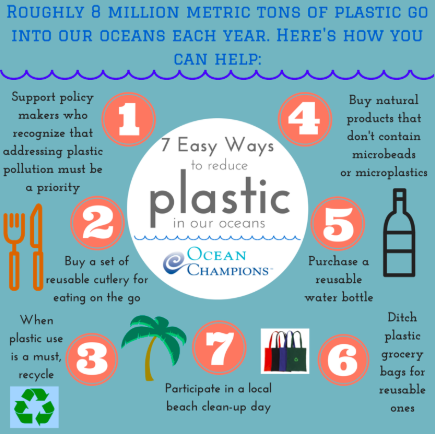
5. We will be revising the Social Science skill of map-drawing. Go to 'Google Classroom' and read instructions for the mapping activity.
6. Draw a map to show the 'Migration Patterns of Whales in the Southern Hemisphere.' Examples have been included below...

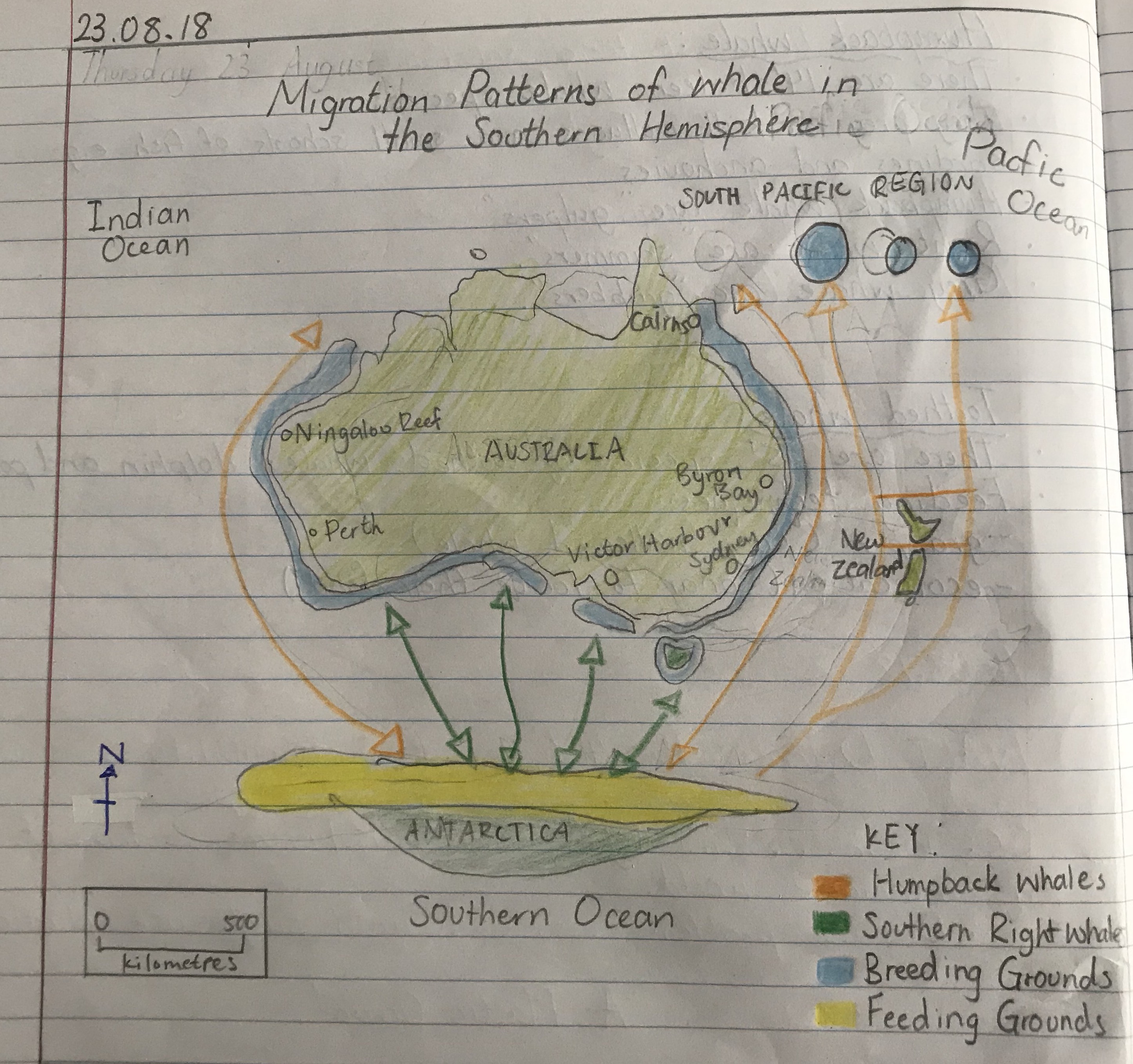
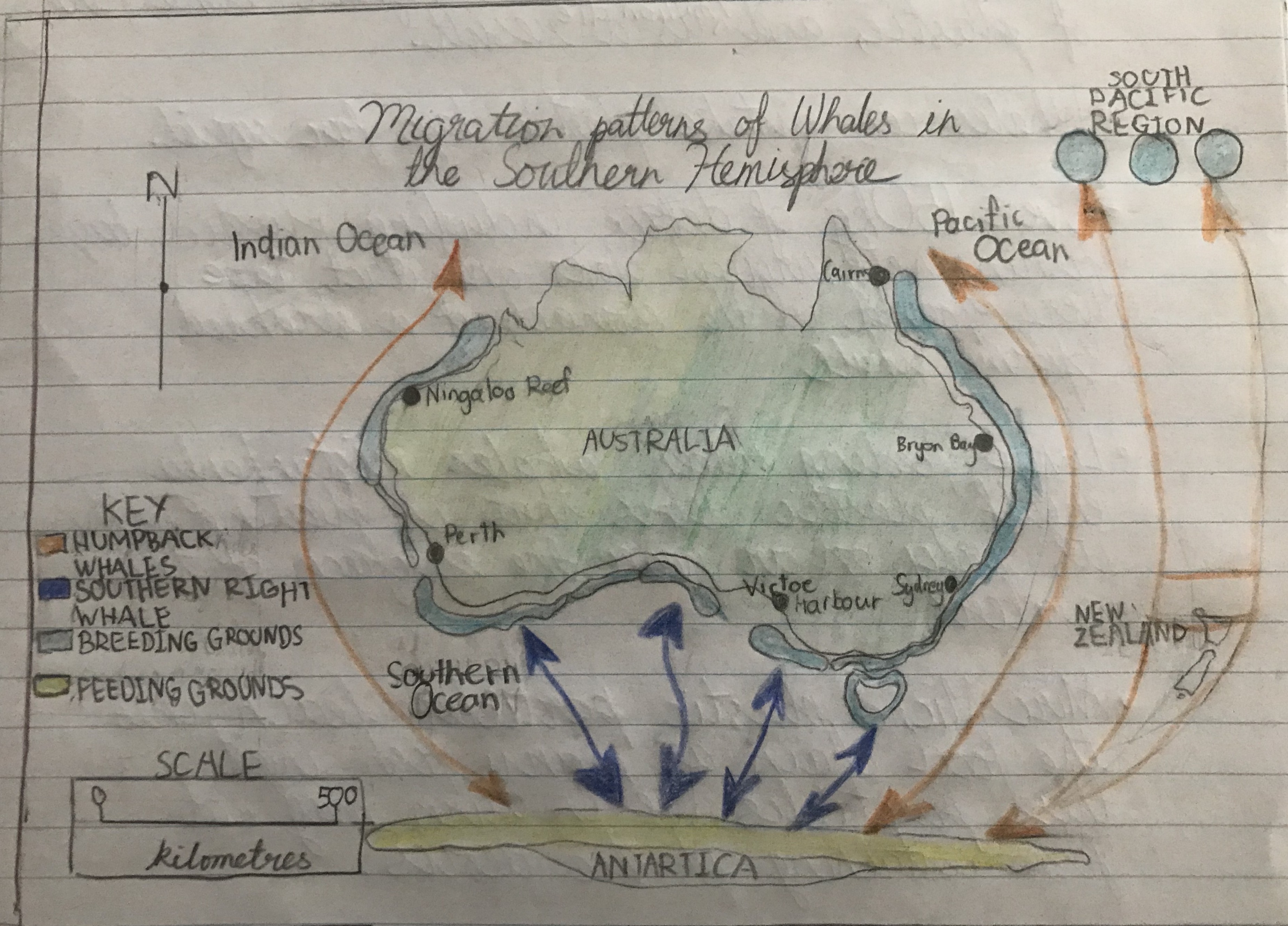
Follow Up Tasks:
Please continue to practice the lyrics and movements to the MHJC Haka "Kia Mana Ake". -
FOCUS / ARONGA learning intentions:
- We are FOCUSING on the various aspects of a sustainability issue, to make decisions about possible actions
- We are FOCUSING on an area of concern in which to focus research and planning
- We are FOCUSING on developing our Social Science skills (eg. mapping (FACKTS), KWS & SWOT charts, and concept maps)
Planning for FIlm-making
Success Criteria: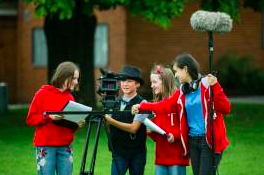
- I can complete a SWOT analysis and concept map chart
- I can identify issues, in terms of a sustainable world
- I can write a storyboard
- I can locate evidence of MHJC's Values-in-Action through my 'Sustainability' group work
Activities:
- Script-writing
- Story-boarding
- Filming
- Editing
- Documents for entry
Follow Up Tasks:
Please continue to practice the lyrics and movements to the MHJC Haka "Kia Mana Ake". -
FOCUS / ARONGA learning intentions:
- We are FOCUSING on the various aspects of a sustainability issue, to make decisions about possible actions
- We are FOCUSING on an area of concern in which to focus research and planning
- We are FOCUSING on developing our Social Science skills (eg. mapping (FACKTS), KWS & SWOT charts, and concept maps)
Success Criteria:
- I can construct a map that shows FACKTS... Frame, Axis/arrow, Colour, Key, Title and Scale
Activities:
1. This week will be completing our Term 2 mapping assessment during class time. Instructions and resources are on our Google Classroom page.
2. Please show your understanding of FACKTS in the completion of your mapping activity.
3. Please hand in your assessment to Miss Kindley for marking, then paste your marked assessment into your Global Studies exercise book.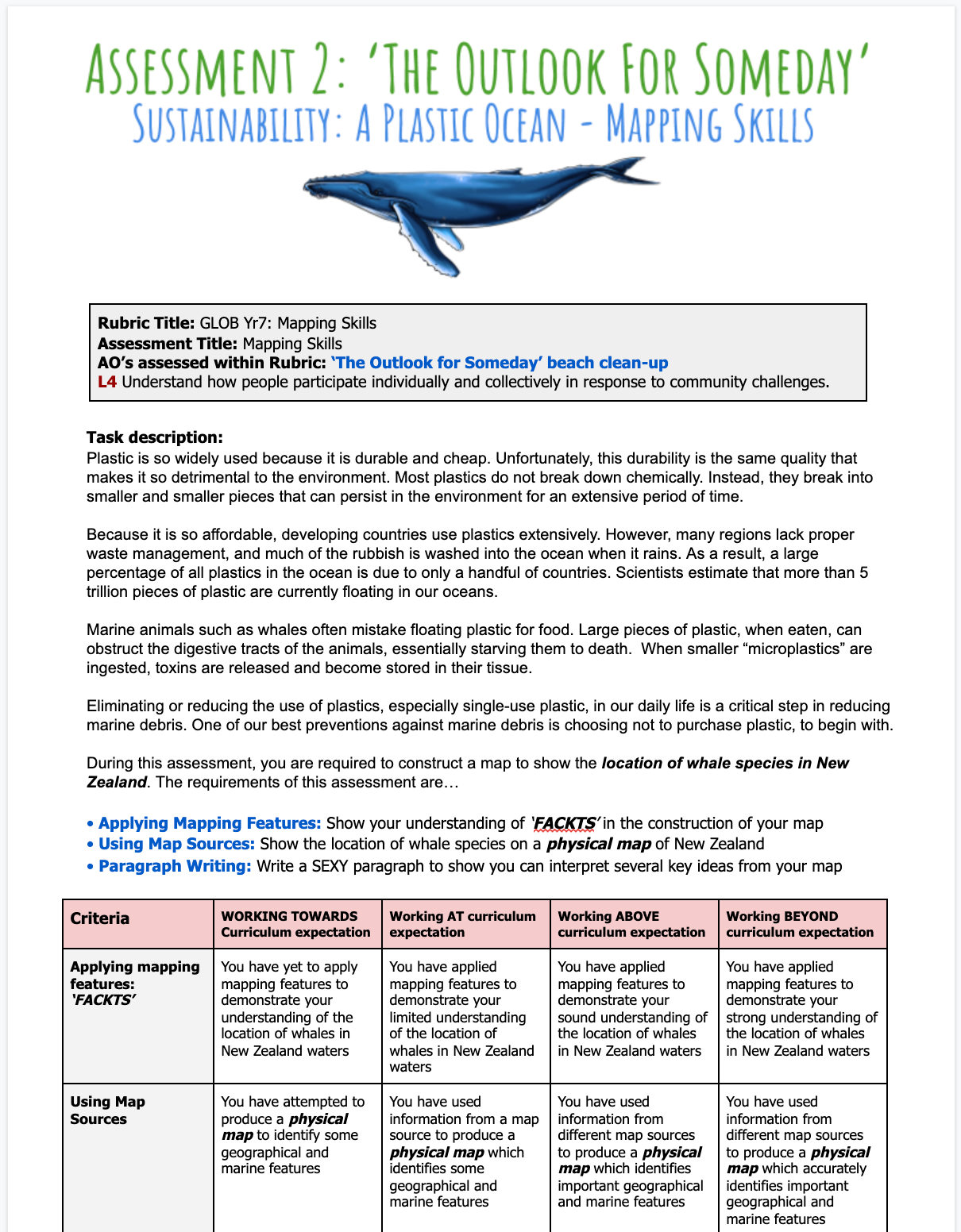
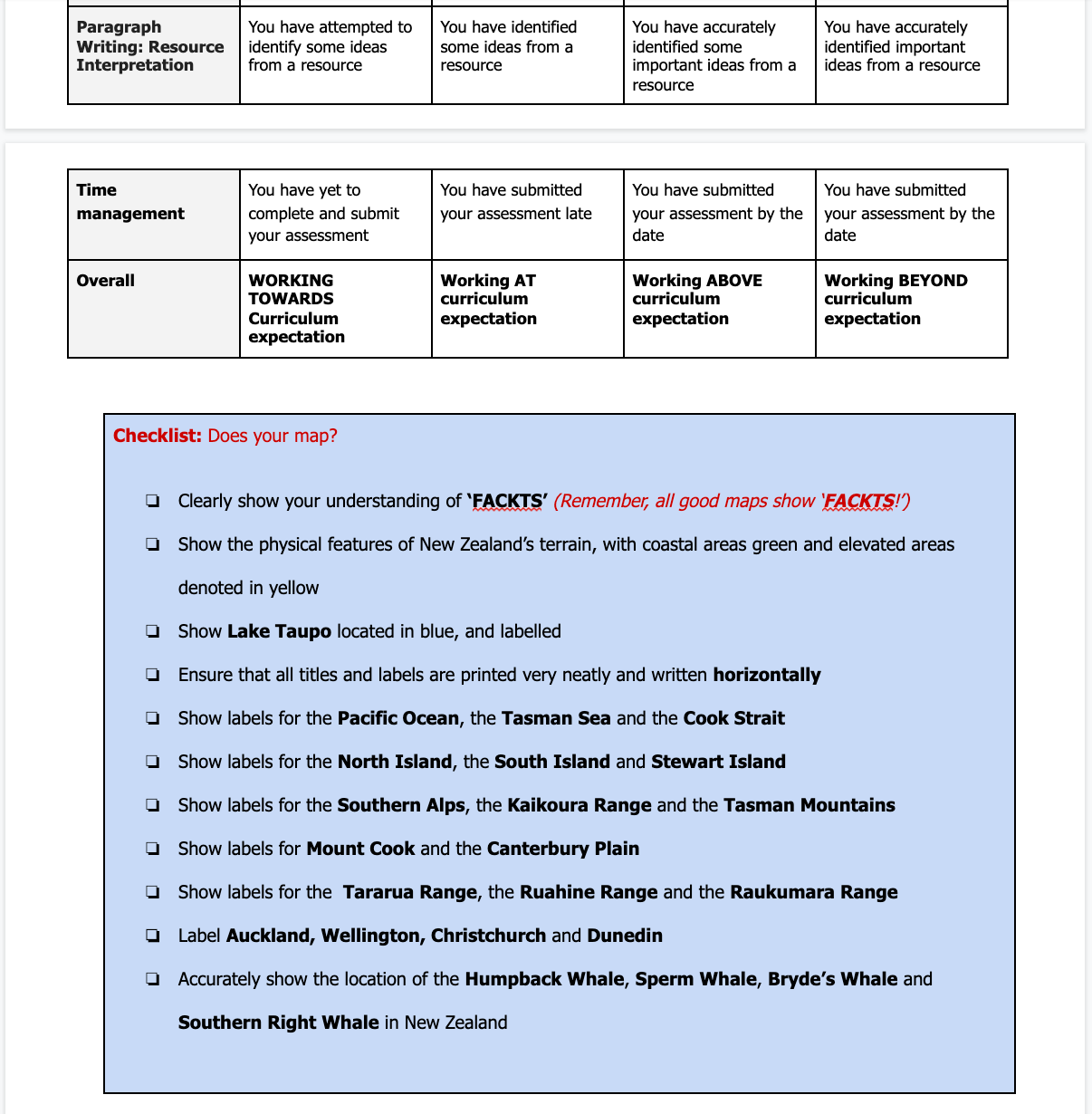
Follow Up Tasks:
Please continue to practice the lyrics and movements to the MHJC Haka "Kia Mana Ake". -
FOCUS / ARONGA learning intentions:
- We are FOCUSING on the various aspects of a sustainability issue, to make decisions about possible actions
- We are FOCUSING on an area of concern in which to focus research and planning
- We are FOCUSING on developing our Social Science skills (eg. mapping (FACKTS), KWS & SWOT charts, and concept maps)
Planning for FIlm-making
Success Criteria:
- I can complete a SWOT analysis and concept map chart
- I can identify issues, in terms of a sustainable world
- I can write a storyboard
- I can locate evidence of MHJC's Values-in-Action through my 'Sustainability' group work
Activities:
- Matariki activity
- Script-writing
- Story-boarding
- Filming
- Editing
- Documents for entry
Follow Up Tasks:
Please continue to practice the lyrics and movements to the MHJC Haka "Kia Mana Ake". -
FOCUS / ARONGA learning intentions:
- We are FOCUSING on the various aspects of a sustainability issue, to make decisions about possible actions
- We are FOCUSING on an area of concern in which to focus research and planning
- We are FOCUSING on developing our Social Science skills (eg. mapping (FACKTS), KWS & SWOT charts, and concept maps)
- We are FOCUSING on developing our knowledge on the significance of Matariki
- I can identify issues, in terms of a sustainable world
- I can write a storyboard
- I can locate evidence of MHJC's Values-in-Action through my 'Sustainability' group work
- I have completed most of the activities from the Matariki activity book.
Activities:
DO NOW: Current events Quiz
- Matariki activity.
- Complete your note-taking skills task that we started in class last week. https://www.tepapa.govt.nz/
discover-collections/read- .watch-play/maori/matariki- maori-new-year/legend- matariki-and-six-sisters - Watch this video :https://www.youtube.com/watch?
v=h3ETD3rPnFQ . - Outlook for Someday video Submissions: Reflection: What went well? What did not work well? Looking at areas that did not work well, improve those areas with your group during our Global Studies Session.
- Viewing the Outlook for Someday videos.
-
KIA ORANA EVERYONE
FOCUS / ARONGA learning intentions:
- We are FOCUSING on the various aspects of a sustainability issue, to make decisions about possible actions
- We are FOCUSING on an area of concern in which to focus research and planning
Planning for FIlm-making
Success Criteria:
- I can identify issues, in terms of a sustainable world
- I can write a storyboard
- I can locate evidence of MHJC's Values-in-Action through my 'Sustainability' group work
Activities:
DO NOW: Cook Island Language Week
- Find 3 facts about the Cook Island.
- Reflection on your Outlook for someday videos
- Script-writing
- Story-boarding
- Filming and Editing
- Haka Practice
Follow Up Tasks:
Please continue to practice the lyrics and movements to the MHJC Haka "Kia Mana Ake"
-
REFLECT / WHAIWHAKAARO learning intentions:
- We are REVIEWING competition requirements, to upload a video submission
- We are REFLECTING upon the effectiveness of our sustainability message
- We are REFLECTING upon barriers, obstacles and successes in our teamwork
Activities:
- Reshooting scenes
- Editing videos
- Looking at the competition requirements and form - Mrs Selagan to view your video
- Current events Task : https://kids.nationalgeographic.com/explore/countries/
-
Kia Ora 7F1
Welcome to Maori Language Week!
This year for Māori Language Week, we are having a “Māori Language Moment” at 12pm on Monday 14th September to commemorate the actual time and day in 1972, when 30,000 signatures were delivered to Parliament calling for te reo Māori to be taught in schools.
We will also be participating in this event with thousands of others across the country, by choosing a/various Māori language activity/activities so that you are able to earn a cultural cornerstone.FOCUS / ARONGA learning intentions:.
- We are FOCUSING on using Te Reo to embrace and advance the aims of 'Maori Language Week'.
Activities:
- Participation in Maori Language Week activities to earn a Cultural Badge.
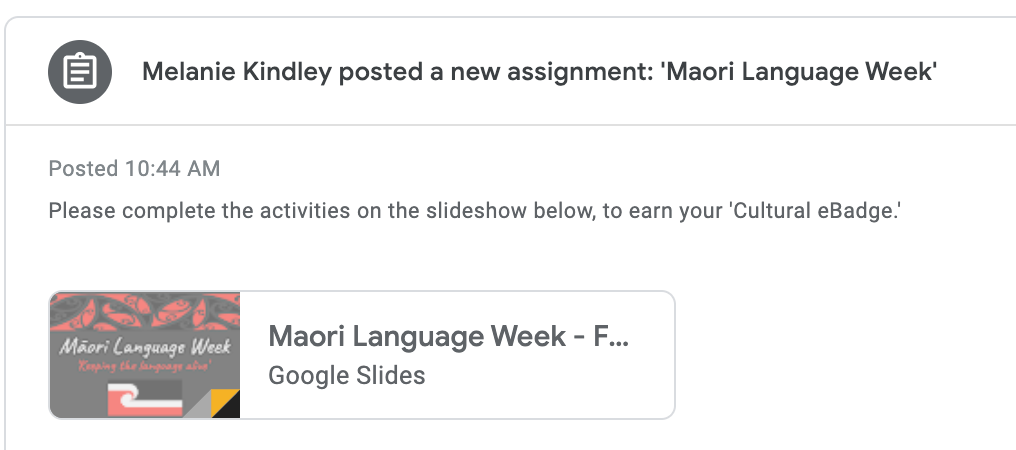
-
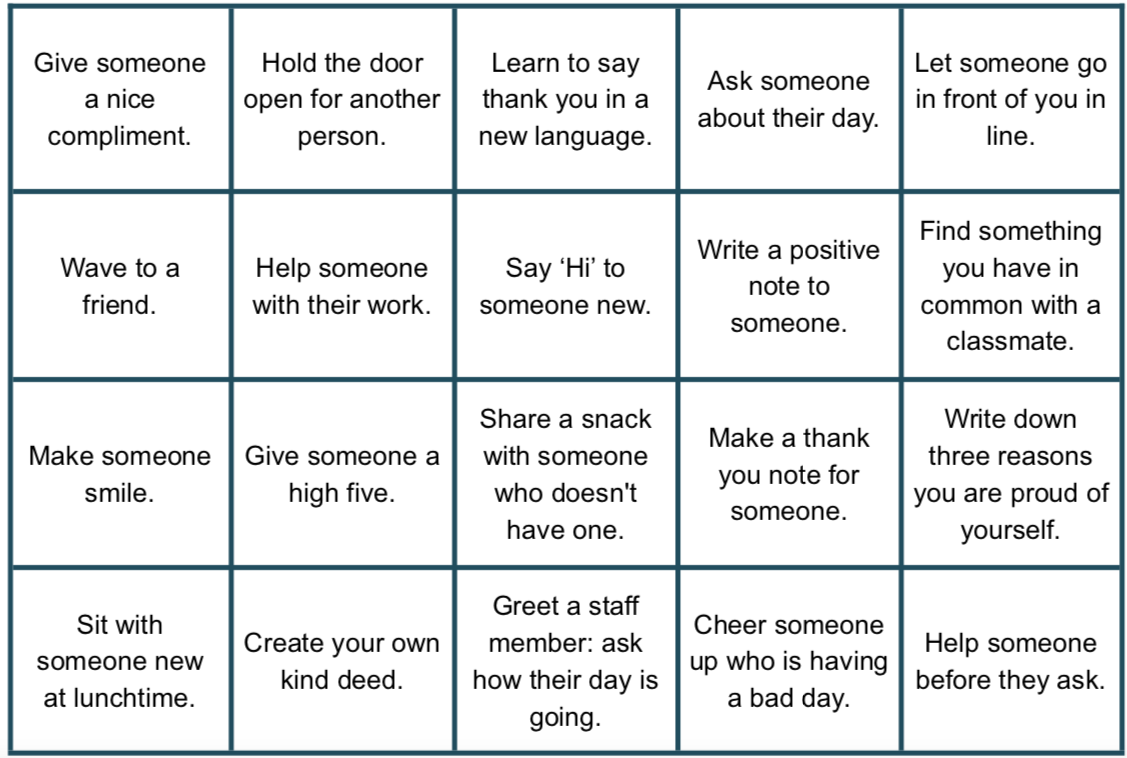
FOCUS / ARONGA learning intentions:.
- We are FOCUSING on engaging and embracing in various activities for Kindness Week.
Activities:
DO NOW: Answers from political parties sheet
- Kindness Week Activities: You will aim to complete as many activities on the grid before the end of the week.Your challenge this week is to write a positive note, thank you note and write down 3 reasons why you are proud of yourself.
- Kindness week slideshow: Reinforcing and reminding us to be a kind and responsible citizen
- Current Events: Weekly Current Events Quiz and exploring Sporcle.com and using the tab tilted: Quizzes
- Research Task: You will be researching a person that has made a difference to society displaying an act of kindness: ie. the change makers of society WHO HAVE SPREAD PEACE AND KINDNESS. After you research, you are required to create a brief profile of the person that you chose.
For example the Leadership Council , were recognising the work form Mother Theresa, who "professed the vow to give wholehearted free service to the poorest of the poor". Her incredible service began in 1950, in India, where she ran soup kitchens, dispensaries, mobile clinics, children's and family counselling programmes, as well as orphanages and schools. Mother Theresa had served millions of people in her time, before she died in September, 1997. In recognition of her work towards humanity, she was the recipient of the Noble peace prize in 1979.
-
FOCUS / ARONGA learning intentions:
- We are FOCUSING on engaging and embracing in various activities for Kindness Week.
- We are FOCUSING on current events
Activities:
DO NOW: Answers from political parties sheet
- Current Events: Weekly Current Events Quiz and exploring Sporcle.com and using the tab tilted: Quizzes
- Research Task: You will be researching a person that has made a difference to society displaying an act of kindness: ie. the change makers of society WHO HAVE SPREAD PEACE AND KINDNESS. After you research, you are required to create a brief profile of the person that you chose.
Use the google doc provided on Google classroom to create your profile.
For example the Leadership Council , were recognising the work form Mother Theresa, who "professed the vow to give wholehearted free service to the poorest of the poor". Her incredible service began in 1950, in India, where she ran soup kitchens, dispensaries, mobile clinics, children's and family counselling programmes, as well as orphanages and schools. Mother Theresa had served millions of people in her time, before she died in September, 1997. In recognition of her work towards humanity, she was the recipient of the Noble peace prize in 1979.
-
FOCUS / ARONGA learning intentions:.
- We are FOCUSING on engaging and embracing in various activities for Kindness Week.
- We are FOCUSING on current events
Activities:
- Current Events: Weekly Current Events Quiz and exploring Sporcle.com and using the tab tilted: Quizzes
- Introduction of 'Grand Designs' Zoological Edition: Term 4 Context - Design Brief
-
FOCUS / ARONGA learning intentions:.
- We are exploring the best ZOO's around the world
- We are FOCUSING on current events
- We are focusing on improving our debating skills
Activities:
- Current Events: Weekly Current Events Quiz
- Introduction of 'Grand Designs' Zoological Edition: Term 4 Context - Design Brief
- Monday: Closing statements from last week's debate to determine overall winning team
- Tuesday: Athletics (No Global)
- Thursday: Zoo trip (No Global) - Have fun! Share some cool photos with me when you get back from your trip.
-
Current events, how to structure a letter of thanks and drafting of letters of thanks.
FOCUS / ARONGA learning intentions:.
- We are exploring the best ZOO's around the world
- We are FOCUSING on current events
- We are focusing on improving our debating skills
Activities:
- Current Events: Weekly Current Events Quiz
- Introduction of 'Grand Designs' Zoological Edition: Term 4 Context - Design Brief
- Debating Groups x 4 (Topic related to your context)
- Groups will be presented by Mrs Selagan after you agree/disagree with the topic presented.
- Research time (15 -20 minutes)
- Use the table presented in class to research the best "zoo's" in the world
-
Current Events and Publish letters of thanks to zoo helpers.
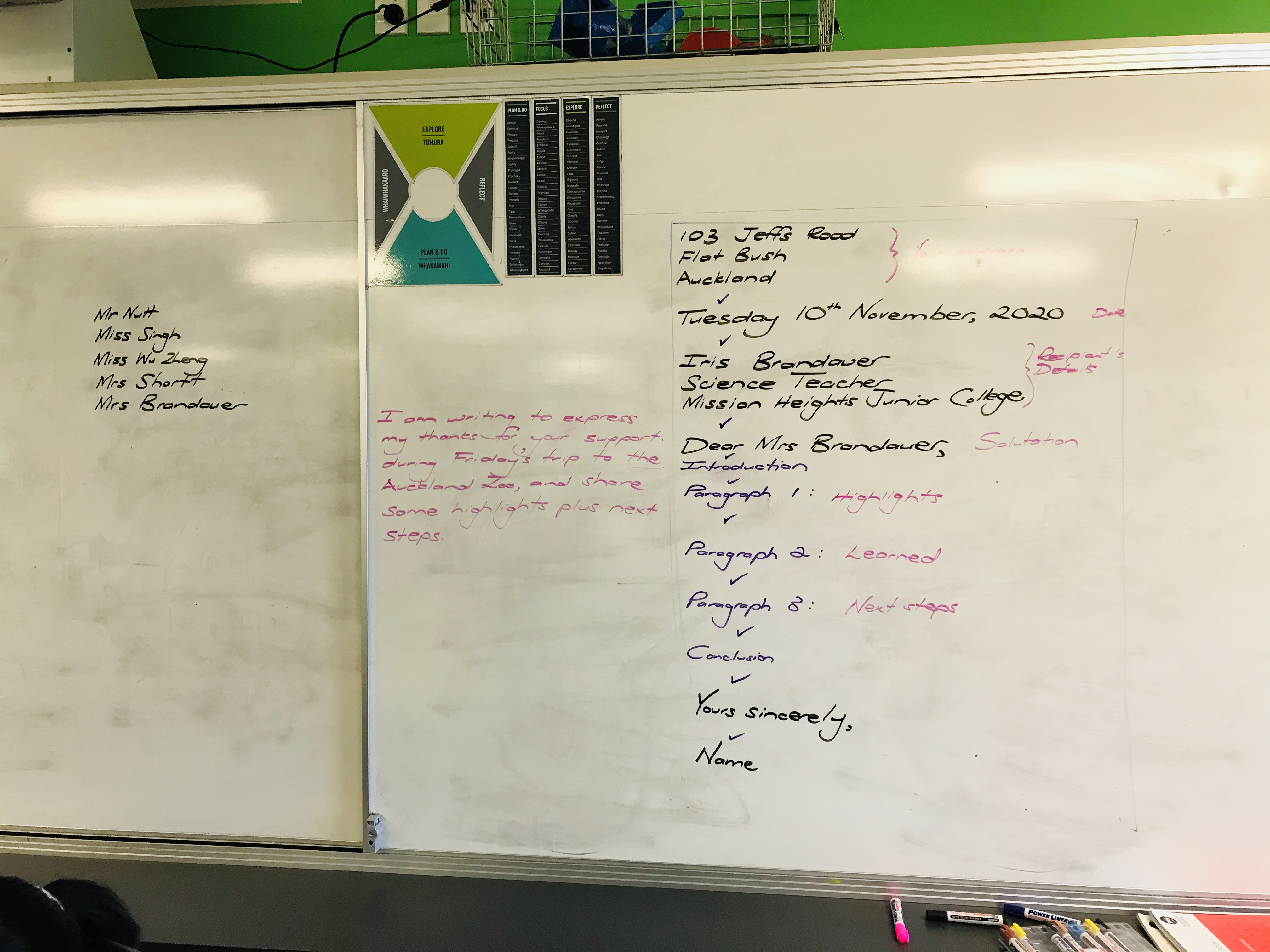
FOCUS / ARONGA learning intentions:.
- We are exploring the best ZOO's around the world
- We are FOCUSING on writing our Thank You Letters to our group Leader for our Zoo Trip
- We are focusing on improving our debating skills
Activities:
- Completing Thank You Letters to support Diorama
- Buddy Check: proofread letters
- Debating Groups x 4 (Topic related to your context)
- Groups will be presented by Mrs Selagan after you agree/disagree with the topic presented.
- Research time (15 -20 minutes)
- Use the table presented in class to research the best "zoo's" in the world
-
Zoo enclosures - causes of habitat loss signage and map of country of origin.
FOCUS / ARONGA learning intentions:.
- We are FOCUSING on proofreading our Thank You Letters to our group Leader for our Zoo Trip
- We are focusing on improving our debating skills
- We are Focusing on writing thank you letters for our Y10 students
Activities:
- Week 7 Current Events quiz.


